#related to my post about the parallels between these two
Explore tagged Tumblr posts
Text







We're Harkonnens. So this is how we'll survive. By being Harkonnens.
#dune#dune part 2#dune 2#related to my post about the parallels between these two#two sides of the same coin#a very messed up coin#a coin minted by the bene gesserit many generations ago#a coin that paul was willing to be a part of in order to achieve his goals#to lean into the legacy of house harkonnen to have his vengeance for his father#paul atreides#feyd rautha harkonnen
28 notes
·
View notes
Text
Trafalgar Law on touching and being touched
It won't be a perverted post despite the title lol. But I won't stop your imagination, be free!
There's this funny theme going on with Law and Luffy in particular that picked my interest.

Luffy touched him first.

And he later returned the gesture, much more awkwardly.

Again, Luffy grabbed him angrily first.

Law made sure to return the gesture. (btw he also does it with Zoro, who was the first one to wrap an arm around him at post-Dressrosa feast. In Wano Law has no problem grabbing Zoro and shouts at him angrily. Again, it was Zoro who initiated the touch first).

Law grabbing Luffy to teleport them makes Luffy react in a curious way, you wanna know why?

Because it totally feels like this moment. Both Law and Ace, right after getting uncuffed, grabbed Luffy in same way to get him to a safer place. Ace-Law parallel in relation to Luffy kills me. The whole Dressrosa arc's plotline between Luffy and Law is just Marineford Went Well This Time. Ngl I kinda hated Oda at first for that. Now i dig it.

He didn't seem to like that. Luffy says "Let's all get along well!", but Law thinks alliances don't have to "get along".

Mistranslation here. What Law says here, being so surprised, is "nakayoshi ka?!" which means "you two get along?!" or "you two are buddy-buddies?!". It's a callback to Luffy declaring that Law and Strawhats crew should get along (he uses same word then, nakayoku-get along), Law learns here that Luffy's crew indeed "gets along well". You can interpret it whatever way you wish, but I will use it this time to put this scene into context:

The same gesture Luffy did to him before, but Law didn't return it to Luffy - that's because they're not crewmates. But he takes the lesson to heart and "gets along" with his own crew. Omg I can't believe i'm writing it, I make Law sound like this completely awkward adult who doesn't know how to be friends with people.
But bear with me, the shit is only starting. If you don't want to have feels I reccommend you just laugh at it and stop reading here. I digged up a feels landmine by accident. In-depth study starts below!

It's also a possible callback to the "reassurance" Law got from Cora-san. "I'm counting on you to escape" and Law did. He counts for his crew to steer the submarine well in similar manner.

Law's family didn't seem very touchy-feely, so please keep that in mind as well. He's got limited experience with touches and the few touches he did get familiar with were either taken away from him or brutalized.

Law getting patted on the head lovingly by his parent.

Next time this loving gesture happens, he gets thrown from like two-floor building into a pile of garbage.

And then he gets lied to that everything will be fine. We all know it wasn't.

Do you still wonder why he hates being touched on the head?

The sister touches his face gently while showing child Law support and compassion, reminding him not to despair, someone kind will help him.

Corazon doing the same gentle touch to the face while crying for him, thinking of all the pain Law had to experience. Indeed, the world sent Law someone kind. And Law lost him and blames himself for that.

Law holding Lammy's hand while lying to her that it will be alright. He never does that gesture again to anyone.

The sister holding Law's hand.

"Don't come closer! Don't touch us! We will get infected!" even doing the barrier gesture (I guess that's why Law doesn't get along with Bartolomeo). I used only few examples, there is much more, I just couldn't bear posting them all. Anyway, Law's got the message, his touch is unwanted. The body and mind remembers this.

Similar shit said at the auction in Sabaody about Fishmen, we don't see Law's reaction to that, but we can guess already that it was for sure triggering. Those people talking are sitting not that far away from him.

Ever wondered why Law throws people when teleporting? Besides the fact he avoids making contact with anyone unless they initiate it first, because that trauma is still strong in him ("Stay away! Don't come closer!"), there is one other possible reason:

Wonder no more! He does it to people because that's how people treated him as well, even people who apparently loved him.
Now that I have ruined the "Law is just an awkward unsocial nerd" joke for you, let me offer something to warm your heart a bit in exchange:

Corazon made sure to touch Law a lot and hold him in his arms, despite being often clumsy about it. I think he understood Law's trauma about being touched and his fear to touch or approach anyone, and tried to help him overcome it.
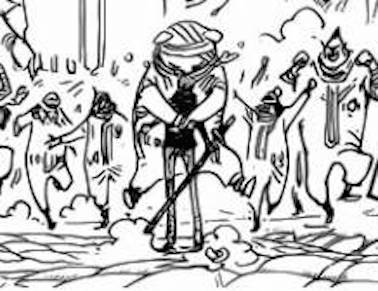
Being hugged and trying to return the gesture. Corazon's efforts did bring some results! But it only works for very few people, Law is still wary of people he doesn't know well. He expects to be unwanted and acts uneccessarily cold, distant and unapproachable because of that. But if you scroll back to the beginning of this post, you can see that he is trying his best to overcome it as well, one step at a time. Some things just can't be rushed.

And hey, at least he seems to be actually relaxed and almost like he *enjoys* being carried around. You think it makes him look uncool? Definitely. But suddenly it feels like Something Important, kinda intimate in a way and not just a silly comedy moment. It's a sign Law relies on people when he lets them carry him and that's why he doesn't protest.

Sanji is like "Why are you relaxing like that?! Get off!!" Finally, it makes sense why Law makes such a sour face here. Sanji should be grateful for the rare privileage after all! Anyway, this is anime-only extension, in manga Sanji actually doesn't tell Traffy to get off and Law chooses to scramble by himself, which doesn't taint the fragile trust those two just shared.
For those who made it to the end of this post, have I ruined Law's comedy moments for you forever? Because I sure just did that for myself.
I could also add one more cute thing from One Piece World Seeker Law's dlc, but I will let those interested to discover it by themselves!
I'm also amazed by the consistency of this theme. Both manga and anime never forget that touch is seemingly a big deal for Law.
#one piece#trafalgar law#donquixote rocinante#corazon#luffy#bepo#sanji#lawlu#sorta if you squint#trauma#gosh this took long time to do#Law and PTSD#one piece meta
660 notes
·
View notes
Text
Just going to cry again (see: my previous post about the parallels between the storage room scene and the abandoned factory scene) about parallels and juxtapositions in the store room scene vs the one in Styles bedroom:


Both these scenes have such a tone of desperation and are characterised by an overflowing of emotions, but in drastically opposite directions.
(Note, some of what I say in this post directly relates to concepts and themes I talked about here, so it may not wholly make sense without that context.)
The scene in the storeroom is filled with frustrated desire. Fadel kisses Style because he wants Style's body and also wants to take his frustrations at Style out on his body. He doesn't need to look Style in the eye (and in fact very intentionally only does so only in small snatches) because this isn't about a connection as much as it is about a release. Fadel's kisses come fast, hard, and are intended to bruise more than to adore.
But episode 5's scene is filled with much more quiet and tender sort of desire. Style is kissing Fadel so much more slowly and purposefully. He keeps looking back at Fadel, checking in to see how he feels and whether Fadel is enjoying it. Everything Style wanted in Episode 3, he now gives to Fadel here, pours the secrets of his knowing and choosing Fadel anyway into the way he presses his lips onto Fadel's skin. His kisses linger, they carry a weight but are not gentle, and contain meaning that Fadel's kisses couldn't in Episode 3 because in all honesty they were relative strangers back then.


There's also the way there's such a ferocity and carelessness in the way Fadel starts the encounter in episode 3 that is juxtaposed beautifully by the slow, tender, almost hesitant way Style slides his lips onto Fadel's. Both of them are in such different headspaces, between these episodes and its especially evident in the way they care so much more about the other person's comfort and how intentionally they showed that to the audience.


There's hunger present in both scenes but what this hunger is focused on is so drastically different. In the storeroom, they're both mainly focused on a physical release; its primal and visceral but lacked emotional resonance. Fadel gives Style what he knows Style wants (that hint of danger, with the hand on his neck), but its not because he really cares about what Style wants on anything more than a physical level. In Style's bedroom, however, Fadel is drunk (intentionally and by his own design) and desperate to open himself up to Style on an emotional level. Meanwhile, Style wants that desperately too, but knows that Fadel shouldn't because of his own terrible secret. So this kiss is what they both will allow themselves - an honesty and a hunger for this deeper connection they can only share in act but not in words.


In the storeroom, Style wants Fadel to want more than his body but knows (or thinks) he can't push for it yet, so he remains passive, lets Fadel do whatever he wants, lets him turn and shove and place Style how he wants because at this point, this is all Fadel will give him. Here, Style is passive in spite of what he wants. But in the bedroom, Fadel is passive because it's what he wants; he wants to let Style do whatever he desires to and with Fadel's body. He wants to lay himself as bare as he possibly can, which is only physical, and so he does.
And because the encounter in Episode 3 lacked that emotional connection, the focus is merely their respective releases. There's a sense of two people trying to find pleasure and 'finish' while remaining emotionally disconnected despite actively having sex with each other. Because in some ways, they didn't really need each other in that moment to get there (there's actually a lot of truth in what Fadel says about it being easier to just jerk off alone). In sharp contrast, the scene in Episode 5 isn't focused on the destination but on the journey. Style is taking his time and Fadel is letting him - Style is choosing to worship Fadel's body, with his fingers, with his lips, to respond to his vulnerability with gentleness and tenderness and adoration. The goal has stopped being about finding a release, it's about allowing both these men to revel in the giving and receiving of pleasure.
The point of these scenes is to show to us the ways in which Fadel and Style have grown to care for and, dare I say it, love each other in ways that are so purposefully portrayed by showing the nature of their physical connection. Because the ways in which these scenes are the same and yet so wholly different showcases how their touches are now no longer merely tied to their senses any longer, but also to their hearts as well.
#when i say i am OBSESSED ugh T_T#what joongdunk did in episode 5 just makes me appreciate and anew how much they're intentionally changing things each time#there's such care taken to portraying the characters growth and change of feelings and we are so blessed to be able to experience it!#the heart killers#the heart killers the series#fadelstyle#stylefadel#joongdunk#joong archen#dunk natachai#thk ep 5#thk ep 3#thk meta#<my posts>#shoutout to all the gifmakers because this post wasn't nearly as impactful with stills#i do wish there was a better way to search for gifs though TwT#also i've never been a colour analysis girl (because i don't know enough about it; not because i'm not interested...#i mostly don't know where to start)#but wow the lighting feels very intentional too: the cold and clinical shades of blue indicating the emotional distance between them#vs the warm and soft red/orange glow surrounding style's bedroom scene#yeah everything about these scene was so beautifully done and i'm so grateful we get to see it TwT
239 notes
·
View notes
Text
The improvement in alhaitham and kaveh’s relationship post-parade of providence is TANGIBLE!!! I’ll talk about things of note from cyno's story quest 2 before posting my deep diving into what this all means for them <3
Firstly, kaveh’s appearance in the tavern being to pick up his order of wine, only to show his parting from the traveller, to ask lambad whether his order includes ‘the coffee beans’ – which is a direct reference to his 2023 bday letter in which he and alhaitham test coffee beans together for his birthday, and now, canonically, this can be observed as a common practice for the two of them – this is symbolic of domesticity, as the two only do this outside of the player’s sight, confined to the privacy of their home.
Alhaitham’s introduction within this quest is waking the traveller up (to which they ignore haikaveh and honestly, valid) due to their discovery of the temple of silence – and I think this is a little self-indulgent on my part, but I think it’s Interesting that tighnari mentions that the tent paimon picks is prone to being stumbled into by ‘sleepwalking fungi’, which prompts cyno to encourage the traveller to safeguard their tent with a weapon. Paimon comments on the improbability they will be attacked or woken up by uninvited guests, and lo and behold, haikaveh turn up – implying they are the sleepwalking fungi? it’s reminiscent of alhaitham’s story quest where alhaitham questions if kaveh would devolve into a fungus, to which kaveh replies he would be a fungus with empathy… if this is at all deliberate, it’s a really cute parallel!!
The completely unnecessary flashback scene in haikaveh’s house, it’s purely there to showcase the development of their relationship - there was no need to animate something that could have been exposition?
(The scene is established with alhaitham reading a book with kaveh offscreen preparing snacks and wine for the two of them, and when kaveh enters, alhaitham puts the book down and directly engages with kaveh’s conversation with a CRIMINAL smile on his face. Kaveh continues the conversation whilst sitting on the table, which shows his comfort and familiarity within the house? With alhaitham? This is also heightened when he leans back on the table during the conversation. Alhaitham is shown thinking about the case and kaveh offers to draw the emblem on the paper of the extortion letter – when kaveh turns his back to do so, their conversation is halted, and only then does alhaitham bring out the book again, but there is a deliberate still on his face as he looks UP from his book to look at kaveh sketching? There was no need for this.!!.>!!!
When kaveh returns to show alhaitham the sketch, the book is gone again, and the previous distance between them is closed – kaveh sits on the table in front of alhaitham, and this creates an intimacy as the two directly face each other. this couldn’t have been established solely by sitting next to each other on the divan. Alhaitham smiles at the sketch and notes that he recognises it, to which kaveh smiles(!!!) at and questions this. Alhaitham recognises the ARCHITECTURAL signets within the symbol, which not only relates back to their joint thesis but also their character concepts as mirrors, as alhaitham appropriates kaveh’s architecture, and kaveh has appropriated alhaitham’s language – which suggests a balance between the two.)
Alhaitham and kaveh working together to identify the emblem to be that of the temple of silence acts as the catalyst for the chain of events within the story quest
Kaveh quipping at alhaitham keeping the salary of the acting grand sage – but with no animosity behind it!??? his last expression during this dialogue honestly looks exasperated but in a fond way…. Im ill….
Alhaitham and kaveh looking at each other when discussing how the case doesn’t make sense… just alhaitham and kaveh looking at each other and deliberating over the other’s thoughts… finally… listening to each other and working together…
The additional (HIDDEN) scene in the house of daena where they begin researching, with alhaitham commenting that he will look for texts pertaining to the temple of silence, to which kaveh says it will take too long, and then agreeing to help alhaitham, without alhaitham having to ask, which demonstrates their improved synergy. Kaveh asks alhaitham how to teach him in gaining information on the sly, to which alhaitham DOES but teases him about it at the same time, but so fondly... I would say this scene mirrors the additional scene in the archon quest, with kaveh talking to alhaitham by the bookshelves and accusing him of stirring trouble in sumeru, while alhaitham appears bitter that kaveh was in the desert during the overturning of the sages. There is a distinct shift in their relationship here – in the past, the two missed an opportunity to work together, whereas here they are voluntarily banding together (which ive discussed here)
COFFEE MENTION 2! Alhaitham mentions how he wants to drink coffee, to which kaveh laments that he wasn’t able to bring any from home. When using nahida’s skill on them, alhaitham can be seen thinking about wanting coffee,,, and then kaveh is thinking about how to get to coffee to them by using mehrak. Even their thoughts are working in tandem??? This contrasts with their individual thoughts in alhaitham’s story quest, where kaveh is thinking about how alhaitham was being vindictive towards kaveh drunkenly writing on the bulletin boards, and labelling alhaitham as having ‘terrible thoughts’, all the while alhaitham is thinking about how dusty the bookshelves are… the progress is STARTLING
When the group reconvene in the house of daena, alhaitham and kaveh have progressed their research on their own accord and based on what naphis has told them. When explaining, the two complete each other’s sentences, and this rounds off with alhaitham conjecturing that the goal of the assailant was to get cyrus to see the letter, which makes kaveh realise cyno’s motivations, and for alhaitham then to ascertain cyrus’s whereabouts. Naphis then assigns alhaitham and kaveh to be in charge of the house of daena, to which they both agree, and alhaitham… smiles? With so much pride? WE GET IT YOU’RE WORKING TOGETHER!!!! SHUT!!!
Cyno and tighnari mention TWICE how essential it is that kaveh and alhaitham worked together, with mentioning how imperative it was that kaveh spotted the emblem and that alhaitham connected it to the temple of silence, and then how alhaitham gave tighnari advice on desert cultural traditions, which aligned with kaveh’s experiences with desert tribes, which gives tighnari the idea to turn the tables on the temple of silence
Returning to the house of daena, cyno highlights that it is STRANGE that kaveh and alhaitham are working together, in that he is surprised to see them studying together? This draws further attention to the unlikeliness of the situation, and that this MEANS something in regard to their relationship!
Kaveh stressing about having to pack away their copious research materials, only for alhaitham to reassure him that there’s ‘no rush’… so gentle
Cyno and tighnari thanking alhaitham and kaveh for WORKING TOGETHER as it allowed them to find a swift and good outcome
COFFEE MENTION 3! Cyno offering to take everyone for coffee, which alhaitham agrees to, and kaveh agreeing to, although he says that because of the last few days, he’ll order something different (confirming that alhaitham has the caffeine tolerance of a tank and kaveh gets caffeine jitters thank u @ hoyo). On the table the two were studying, two trays of a pair of coffee cups and coffee brewers can be seen… the same that can be seen in their house??? Meaning they brought their domesticity to the library with them… and they also sat across from each other, which reminds me of how kaveh sat in front of alhaitham in their house, rather than next to him…
Kaveh and alhaitham sitting next to each other in the café <333
KAVEH CALLING THE HOUSE ‘HOME’ TO ALHAITHAM??? IN FRONT OF THEIR FRIENDS?? This is a big contrast to kaveh in a parade of providence and alhaitham’s story quest who hated to having admit such a thing. And then alhaitham AGREEING that the house is ‘HOME’, and again their thoughts align with ‘my thoughts exactly’. Alhaitham and kaveh leaving together, to the house of daena (where they met, where it ended, and where they have been shown to bond together in this quest) and then back to their shared ‘home’... oh......
from this, kaveh no longer seems defensive or reserved in front of alhaitham, and makes no notion of criticising alhaitham, offering to help alhaitham into researching, and even asking alhaitham to teach him something he deems as a useful skill which he lacks. he openly takes onboard alhaitham's views on the case and responds in kind in order to come to a resolution. he actively makes time in his day to spend with alhaitham, seen in them enjoying snacks/wine/coffee together and talking about his day. he describes the house they share as a 'home', which, for kaveh, is imperative to his character due to his loss of family (which ive posted about here)
alhaitham, similarly, is less critical of kaveh, and this is because a seemingly resolved miscommunication between them. he is receptive to, and encourages, kaveh to communicate with him when it comes to things that kaveh believes to be noteworthy, actively focussing solely on kaveh, rather than his book, when kaveh initiates conversation. he equally seems to enjoy this time spent with kaveh, as he is seen nowhere else but by kaveh's side during this story quest, wanting (kaveh's) coffee within the library which would establish a familiar and domestic setting elsewhere outside of their home. when leaving his group of friends at puspa's, saying that it's him 'done for the day', he retreats with kaveh, back to their shared 'home'
overall, alhaitham and kaveh's relationship has improved VASTLY since their first interaction in the archon quest. there seems to be an understanding between them now and this results in comfort and familiarity where they used to be miscommunication and snipes, and there appears to be a balancing of their viewpoints as they appreciate in the other what was once viewed as mirror opposites never to align, being that of language and architecture. a sense of harmony(?) balance(?) has been established here, and this is shown to be the ideal course of their reconciliation. im so weak......
#haikaveh#kavetham#alhaitham#kaveh#cyno story quest spoilers#alhaitham x kaveh#kaveh x alhaitham#haikaveh meta#genshin meta#the table that kaveh perches on and coffee beans are now canon haikaveh motifs#we have keys the house the table and coffee beans?? all so domestic#never getting over the flashback scene in their HOME just to show the player their progression#WHAT DID THEY TALK ABOUT EXACTLY TO GET TO THIS POINT#OR WAS IT JUST A NATURAL SOFTENING AFTER A PARADE OF PROVIDENCE?#as in kaveh readjusted his view of alhaitham and softened towards him outwardly#which resulted in alhaitham recognising a shift had occurred and responded in kind?? SO MANY QUESTIONS
423 notes
·
View notes
Text
yapping about the welcome home 10/18 update because i am so incredibly normal
Hello neighbors! Not exactly my usual content, but since when was I consistent :P I have a lot of thoughts about the new Welcome Home update, so I thought I’d make a post discussing my thoughts n findings, and try to analyze them to make sense of Welcome Home.
SPOILERS BELOW THE CUT! YOU'VE BEEN WARNED!
First of all, right off the bat, on the first page of the storybook, you can see this:

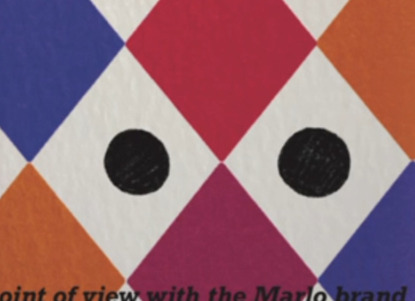
All of these dots in white diamonds are meant to represent eyes, like the Looky-Loo branding alludes to. While they’re all mostly looking in different directions, we have these two who are looking right at the reader. I think these are meant to represent Wally’s eyes. Since we know from the hidden audios from the June ‘23 update that Wally can see through every drawing of his eyes, it looks like Wally is watching us or at least W through the storybook. It’s a tiny detail but so creepy nonetheless!
I want to focus on the end of W’s version of the storybook rather than the contents of the storybook, but I loved seeing a story centered around Sally and some depictions of Sally & Poppy’s dynamic! (Also Eddie calling Sally rude—THE GIRLS ARE FIGHTING. Based eddie tho LOL) I also loved seeing the neighbors all being so eager to help Poppy, but oh my goodness, the way that they did it… YIKES. Poor Poppy…
It’s so interesting that we’re seeing the characters one by one realize that something is wrong with their neighborhood—first Sally in last year’s Halloween update, then Eddie in the Homewarming update, now Poppy.
It’s also interesting how Eddie and Poppy’s episodes(?) parallel each other. First of all, they very clearly focus on isolation from the rest of the neighborhood. Eddie loses all perception of the other neighbors, and the “single pea on a plate” represents his isolation from everyone else. Poppy is literally bricked off from the other neighbors, and she can’t hear them and vice versa until she screams and the door is opened.
The second interesting thing is that both of these episodes have Home involved. Eddie gets uncomfortable and immediately finds himself staring down Home even though he’s inside them. Poppy hears knocks, doors opening, and doorknobs turning—all of which are methods Home uses to communicate. I don’t know if Home is meant to be a metaphor for isolation or a genuine antagonistic force trying to corner the characters when they’re alone and at their weakest. Maybe both?
Still, I was considering that the character who scares Poppy at the end of the storybook audio could also be one and the same with the “monster” (in quotations because it’s unclear whether this is an actual monster) Sally talked about in last year’s Halloween update. That would create a common thread between the two Halloween updates. Still, I’m not sure what that monster is meant to represent and if it is supposed to mean Home or something related to them, like the weird portal underneath it…
Third, it’s very interesting how the two episodes end. Both Eddie and Poppy are brought out of the episodes by the intervention of the other neighbors. But it’s not just any neighbors—both times, it’s Sally and Frank. Sally is the neighbor who notices something is up with Eddie first; she brings him to the Homewarming party, then pulls Frank over to Eddie at the end of Eddie’s episode. When Poppy’s episode ends, we hear two neighbors asking about her. It’s not explicitly stated whose voices they are in the transcript, but it’s clearly Sally and Frank.
Sally and Frank are a really interesting pair; their canon interactions include them getting into a physical fight over song lyrics. But somehow, we’ve seen them twice breaking up these episodes. They don’t appear to be as close as Frank is with Eddie or as Sally is with Poppy, but it would be a very weird coincidence if this was an accident both times.
I strongly believe that Sally and Frank are both aware of what’s happening and trying to work together to either gain a bigger understanding of it, protect the other neighbors, etc. (I also have a theory that Howdy is in on it too, but I won’t focus on that right now.) This is why we see them coming to both Eddie and Poppy’s aid after their episodes.
Another thing!! Connections to other literature seem to be really important in the lore of Welcome Home, so it’s not a throwaway that the play Sally puts on is Tell-Tale Heart. I don’t know a lot about Tell-Tale Heart, but it appears to be about a character who kills a man and buries his still-beating heart under the floorboards, only to be driven mad by the sound. I’m pretty sure we’ve heard Home’s heartbeat before, so I wonder if Tell-Tale Heart is supposed to connect to them… I’ve seen people connect it to Cask of Amontillado, but I’ve never even heard of that so I’ll let other theorists tackle that for now.
On a final note, Wally saying that “everything is as it should be” as the last line of the storybook…completely creeps me out!!!
That’s all for now. I should probably update my other theory soon lol
#welcome home#welcome home theory#welcome home arg#welcome home speculation#wh speculation#wh theory#welcome home spoilers#wally darling#frank frankly#sally starlet#howdy pillar#julie joyful#barnaby b beagle#eddie dear#poppy partridge
150 notes
·
View notes
Text
Double Indemnity, Veritas Ratio and Aventurine

This was originally a part of my compilation post as a short analysis on the Double Indemnity references, linking to this great thread by Manya on Twitter. However, I've recently watched the movie and found that the parallels run much deeper than just the mission name and the light cone itself, plus as the short synopsis I've read online. Since there isn't really an in-depth attempt at an analysis on the film in relation to the way Aventurine and Ratio present themselves throughout Penacony, I thought I'd take a stab at doing just that. I will also be bringing up things from Manya's thread as well as another thread that has some extra points.
Disclaimer that I... don't do analyses very often. Or write, in general — I'm someone who likes to illustrate their thoughts (in the artistic sense) more than write. There's just something about these two that makes me want to rip into them so badly, so here we are. If there's anything you'd like to add or correct me on, feel free to let me know in the replies or reblogs, or asks. This ended up being a rather extensive deep dive into the movie and its influences on the pairing, so please keep that in mind when pressing Read More.
There are two distinct layers on display in Ratio and Aventurine's relationship throughout Penacony, which are references to the two most important relationships in the movie — where they act like they hate/don’t know each other, and where they trust each other.
SPOILER WARNING for the entire movie, by the way. You can watch the film for free here on archive.org, as well as follow along with the screenplay here. I will also be taking dialogue and such from the screenplay, and cite quotes from the original novel in its own dedicated section. SPOILER WARNING for the Cat Among Pigeons Trailblaze mission, as well.

CONTENT WARNING FOR MENTIONS OF SUICIDE. YOU HAVE BEEN WARNED.
To start, Double Indemnity (1944) is a film noir by Billy Wilder (and co-written by Raymond Chandler) based on the novel of the same name by James M. Cain (1927). There are stark differences between the movie adaptation and the original novel which I will get into later on in this post, albeit in a smaller section, as this analysis is mainly focused on the movie adaptation. I will talk about the basics (summaries for the movie and the game, specifically the Penacony mission in tandem with Ratio and Aventurine) before diving into the character and scene parallels, among other things.

—
[THE NAME]
The term "double indemnity" is a clause in which if there’s a case of accidental death of a statistically rare variety, the insurance company has to pay out multiple of the original amount. This excludes deaths by murder, suicide, gross negligence, and natural causes.

The part of the mission in Cat Among Pigeons where Ratio and Aventurine meet with Sunday is named after the movie. And before we get further into things, let's get this part out of the way: The Chinese name used in the mission is the CN title of the movie, so there's no liberties taken with the localization — this makes it clear that it’s a nod to the movie and not localization doing its own thing like with the mission name for Heaven Is A Place On Earth (EN) / This Side of Paradise (人间天堂) (CN).

—
[SUMMARY OF THE 1944 MOVIE]
Here I summarised the important parts that will eventually be relevant in the analysis related to the game.

Insurance salesman Walter Neff, wounded from a gunshot, enters his office and confesses his crime on a dictaphone to his boss Barton Keyes, the claims manager. Much earlier, he had met Phyllis Dietrichson, the wife of Mr. Dietrichson and former nurse. Neff had initially wanted to meet Mr. Dietrichson because of car insurance. Phyllis claims her husband is mean to her and that his life insurance goes to his daughter Lola. With Neff seduced by Phyllis, they eventually brew up a scheme to murder Mr. Dietrichson in such a way that they activate the "double indemnity" clause, and the plan goes off almost perfectly. Initially, the death is labeled a suicide by the president of the company, Norton.
Keyes finds the whole situation suspicious, and starts to suspect Phyllis may have had an accomplice. The label on the death goes from accidental, to suicide, to then murder. When it’s ruled that the husband had no idea of the accidental policy, the company refuses to pay. Neff befriends Phyllis’ stepdaughter Lola, and after finding out Phyllis may have played a part in the death of her father’s previous wife, Neff begins to fear for Lola and himself, as the life insurance would go all towards her, not Phyllis.
After the plan begins to unravel as a witness is found, it comes out that Lola’s boyfriend Nino Zachette has been visiting Phyllis every night after the murder. Neff goes to confront Phyllis, intending to kill her. Phyllis has her own plans, and ends up shooting him, but is unable to fire any more shots once she realises she did love him. Neff kills her in two shots. Soon after telling Zachette not to go inside the house, Neff drives to his office to record the confession. When Keyes arrives, Neff tells him he will go to Mexico, but he collapses before he could get out of the building.
—
[THE PENACONY MISSION TIMELINE]

I won’t be summarising the entirety of Aventurine and Ratio’s endeavours from the beginning of their relationship to their final conversation in Heaven Is A Place On Earth the same way as I summarised the plot of the movie, so I will instead present a timeline. Bolded parts means they are important and have clear parallels, and texts that are in [brackets] and italics stand for the names of either the light cone, or the mission names.
[Final Victor] Their first meeting. Ratio’s ideals are turned on its head as he finally meets his match.
Several missions happen in-between their first encounter and the Penacony project. They come to grow so close and trusting with each other that they can guess, understand each other’s thoughts, way of thinking and minds even in high stakes missions. Enough to pull off the Prisoner’s Dilemma (Aventurine’s E1) and Stag Hunt Game (Aventurine’s E6) and come out on top.
Aventurine turns towards Ratio for assisting him in the Penacony project. Ratio's involvement in the project is implied to be done without the knowledge of Jade, Topaz, and the IPC in general, as he was only sent to Penacony to represent the Intelligentsia Guild, and the two other Stonehearts never mention Ratio.
Aventurine and Ratio cook up the plan to deceive Sunday before ever setting foot on Penacony. Aventurine does not tell Ratio the entirety of his plan.
Aventurine convinces Topaz and Jade to trust him with their Cornerstones. Aventurine also breaks his own Cornerstone and hides it along with the jade within a bag of gift money.
[The Youth Who Chase Dreams] They enter Penacony in the Reverie Hotel. Aventurine is taken to the side by Sunday and has all his valuables taken, which includes the gift money that contains the broken aventurine stone, the jade, and the case containing the topaz.
Aventurine and Ratio speak in a “private” room about how Aventurine messed up the plan. After faking an argument to the all-seeing eyes of Sunday, Ratio leaves in a huff.
Ratio, wearing his alabaster head, is seen around Golden Hour in the (Dusk) Auction House by March 7th.
[Double Indemnity] Ratio meets up with Sunday and “exposes” Aventurine to him. Sunday buys his “betrayal”, and is now in possession of the topaz and jade. Note that this is in truth Ratio betraying Sunday all along.
Ratio meets up with Aventurine again at the bar. Ratio tells Aventurine Sunday wants to see him again.
They go to Dewlight Pavilion and solve a bunch of puzzles to prove their worth to Sunday.
They meet up with Sunday. Sunday forces Aventurine to tell the truth using his Harmony powers. Ratio cannot watch on. It ends with Aventurine taking the gift money with his Cornerstone.
[Heaven Is A Place On Earth] They are in Golden Hour. Ratio tries to pry Aventurine about his plan, but Aventurine reins him in to stop breaking character. Ratio gives him the Mundanite’s Insight before leaving. This is their final conversation before Aventurine’s grandest death.
Now how exactly does the word “double indemnity” relate to their mission in-game? What is their payout? For the IPC, this would be Penacony itself — Aventurine, as the IPC ambassador, handing in the Jade Cornerstone as well as orchestrating a huge show for everybody to witness his death, means the IPC have a reason to reclaim the former prison frontier. As for Ratio, his payout would be information on Penacony’s Stellaron, although whether or not this was actually something he sought out is debatable. And Aventurine? It’s highly implied that he seeks an audience with Diamond, and breaking the Aventurine Cornerstone is a one way trip to getting into hot water with Diamond. With Aventurine’s self-destructive behaviour, however, it would also make sense to say that death would be his potential payout, had he taken that path in the realm of IX.
Compared to the movie, the timeline happens in reverse and opposite in some aspects. I will get into it later. As for the intended parallels, these are pretty clear and cut:
Veritas Ratio - Walter Neff
Aventurine - Phyllis Dietrichson
Sunday - Mr. Dietrichson

There is one other character who I feel also is represented in Ratio, but I won’t bring them up until later down the line.
For the sake of this analysis, I won’t be exploring Sunday’s parallel to Mr. Dietrichson, as there isn’t much on Dietrichson’s character in the first place in both the movie and the novel. He just kind of exists to be a bastard that is killed off at the halfway point. Plus, the analysis is specifically hyper focused on the other two.
—
[SO, WHAT’S THE PLAN?]
To make things less confusing in the long run whenever I mention the words “scheme” and “plan”, I will be going through the details of Phyllis and Neff’s scheme, and Aventurine and Ratio’s plan respectively. Anything that happens after either pair separate from another isn’t going to be included. Written in a way for the plans to have gone perfectly with no outside problems.

Phyllis and Neff —> Mr. Dietrichson
Goal: Activate the double indemnity clause by killing Mr. Dietrichson and making it look like a freak train accident
Payout: Twice or more of the face value of the life insurance ($100,000)
Main Actor: Walter Neff | Accomplice: Phyllis Dietrichson
During the entire time until the payout, Phyllis and Neff have to make sure to any outsiders that they look like complete strangers instead of lovers in an affair.
Step-by-step:
Neff convinces Mr. Dietrichson to sign the policy with the clause without him suspecting foul play, preferably with a third party to act as an alibi. This is done discreetly, making Mr. Dietrichson not read the policy closely and being told to just sign.
Neff and Phyllis talk to each other about small details through the phone (specified to be never at Phyllis’ own house and never when Neff was in his office) and in the marketplace only, to make their meetings look accidental. They shouldn’t be seen nor tracked together, after all.
Phyllis asks Mr. Dietrichson to take the train. She will be the one driving him to the train station.
On the night of the murder, after making sure his alibi is airtight, Neff sneaks into their residence and hides in their car in the second row seating, behind the front row passenger seat. He wears the same colour of clothes as Mr. Dietrichson.
Phyllis and Mr. Dietrichson get inside the car — Phyllis in the driver’s seat and Mr. Dietrichson in the passenger seat. Phyllis drives. On the way to the train station, she makes a detour into an alley. She honks the horn three times.
After the third honk, Neff breaks Mr. Dietrichson’s neck. The body is then hidden in the second row seating under a rug.
They drive to the train station. Phyllis helps Neff, now posing as Mr. Dietrichson, onto the train. The train leaves the station.
Neff makes it to the observation platform of the parlour car and drops onto the train tracks when nobody else is there.
Phyllis is at the dump beside the tracks. She makes the car blink twice as a signal.
The two drag Mr. Dietrichson’s corpse onto the tracks.
They leave.
When Phyllis eventually gets questioned by the insurance company, she pretends she has no idea what they are talking about and eventually storms off.
Phyllis and Neff continue to lay low until the insurance company pays out.
Profit!
Actual Result: The actual murder plan goes almost smoothly, with a bonus of Mr. Dietrichson having broken a leg. But with him not filing a claim for the broken leg, a witness at the observation platform, and Zachette visiting Phyllis every night after the murder, Keyes works out the murder scheme on his own, but pins the blame on Phyllis and Zachette, not Neff.

Now for Aventurine and Ratio. You can skip this section if you understand how deep their act goes, but to those who need a refresher, here’s a thorough explanation:
Aventurine and Ratio —> Sunday
Goal: Collect the aventurine stone without Sunday knowing, ruin the dream (and create the grandest death)
Payout: Penacony for the IPC, information on the Stellaron for Ratio, a meeting with Diamond / death for Aventurine
Main Actor: Aventurine | Accomplice: Veritas Ratio
From the moment they step onto Penacony, they are under Sunday’s ever present and watchful eyes. “Privacy” is a foreign word to The Family. They have to act like they don’t like each other’s company the entire time and feed Sunday information through indirect means so that the eventual “betrayal” by Ratio seems truthful to Sunday. Despite what it looks like, they are closer than one would ever think, and Ratio would never sell out a person purely for information.
Step-by-step:
After Sunday takes away the bag of gift money and box, Aventurine and Ratio talk in a room in the Reverie Hotel.
Aventurine establishes the Cornerstones’ importance, and how he lost the gift money and the case containing the Cornerstones to Sunday. Ratio turns to leave, saying “some idiot ruined everything”, meaning the Cornerstones were vital to their plan. (Note that Ratio is not wearing his alabaster head while saying it to said “idiot”.)
Aventurine then proceeds to downplay the importance of the Cornerstones, stating they are “nothing more than a few rocks” and “who cares if they are gone”. This lets Sunday know that something suspicious may be going on for him to act like it’s nothing, and the mention of multiple stones, and leaves him to look up what a Cornerstone is to the Ten Stonehearts of the IPC.
Ratio points out his absurd choice of outfit, mentioning the Attini Peacock and their song.
Ratio implies that without the aventurine stone, he is useless to the IPC. He also establishes that Aventurine is from Sigonia(-IV), and points out the mark on his neck. To Sunday, this means that Aventurine is shackled to the IPC, and how Aventurine may possibly go through extreme lengths to get the stone back, because a death sentence always looms above him.
Aventurine claims Ratio had done his homework on his background, which can be taken that this is their very first time working together. (It isn’t, and it only takes one look to know that Aventurine is an Avgin because of his unique eyes, so this comment does not make sense even in a “sincere” way, a running theme for the interaction.)
Ratio mentions how the true goal is to reclaim Penacony for the IPC, establishing their ulterior motive for attending the banquet.
Ratio asks if Aventurine went to pre-school in Sigonia after saying trust was reliant on cooperation. Aventurine mentions how he didn’t go to school and how he doesn’t have any parents. He even brings up how friends are weapons of the Avgins. This tells Sunday that the Avgins supposedly are good at manipulation and potentially sees Ratio possibly betraying Aventurine due to his carelessness with his “friends”. Sunday would also then research about the Avgins in general (and research about Sigonia-IV comes straight from the Intelligentsia Guild.)
Ratio goes to Dewlight Pavilion in Sunday’s Mansion and exposes a part of Aventurine’s “plan”. When being handed the suitcase, Ratio opens it up due to his apparent high status in the IPC. He tells Sunday that the Cornerstone in the suitcase is a topaz, not an aventurine, and that the real aventurine stone is in the bag of gift money. This is a double betrayal — on Aventurine (who knows) and Sunday (who doesn’t). Note that while Ratio is not officially an IPC member in name — the Intelligentsia Guild (which is run by the IPC head of the Technology Department Yabuli) frequently collaborates with the IPC. Either Aventurine had given him access to the box, or Ratio’s status in general is ambiguous enough for Sunday not to question him further. He then explains parts of Aventurine’s gamble to Sunday in order to sell the betrayal. Note that Ratio does not ever mention Aventurine’s race to Sunday.
Ratio brings Aventurine to Sunday. Aventurine offers help in the investigation of Robin's death, requesting the gift money and the box in return.
Sunday objects to the trade offer. Aventurine then asks for just the bag. A classic car insurance sales tactic. Sunday then interrogates Aventurine, and uses everything Ratio and Aventurine brought up in the Reverie Hotel conversation and their interactions in the Mansion, as well as aspects that Ratio had brought up to Sunday himself.
Aventurine feigns defeat and ignorance enough so that Sunday willingly lets him go with the gift bag. After all is said and done, Aventurine leaves with the gift money, where the Aventurine Cornerstone is stored all along.
Ratio and Aventurine continue to pretend they dislike each other until they go their separate ways for their respective goals and plans. Aventurine would go on to orchestrate his own demise at the hands of Acheron, and Ratio… lurks in the shadows like the owl he is.
Profit!
Actual Result: The plan goes perfectly, even with minor hiccups like Ratio coming close to breaking character several times and Aventurine being sentenced to execution by Sunday.
This is how Sunday uses the information he gathered against Aventurine:
• Sunday going on a tirade about the way Aventurine dresses and how he’s not one to take risks — Ratio’s comment about Aventurine’s outfit being peacock-esque and how he’s “short of a feather or two”. • “Do you own a Cornerstone?” — Ratio talked about the aventurine stone. • “Did you hand over the Cornerstone to The Family when you entered Penacony?” — Aventurine mentioned the box containing the Cornerstones. • “Does the Cornerstone you handed over to The Family belong to you?” — Aventurine specifically pluralized the word Cornerstone and “a bunch of rocks” when talking to Ratio. • “Is your Cornerstone in this room right now?” — The box in the room supposedly contained Aventurine’s own cornerstone, when Aventurine mentioned multiple stones. • “Are you an Avgin from Sigonia?” —Aventurine mentioned that he’s an Avgin, and Ratio brought up Sigonia. • “Do the Avgins have any ability to read, control, and manipulate one’s own or another’s minds?” — Aventurine’s comment on how friends are weapons, as well as Sunday’s own research on the Avgins, leading him to find out about the negative stereotypes associated with them. • “Do you love your family more than yourself?” — His lost parents. “All the Avgins were killed in a massacre. Am I right?” — Based on Sunday’s research into his background. • “Are you your clan’s sole survivor?” — Same as the last point. “Do you hate and wish to destroy this world with your own hands?” — Ratio mentioned the IPC’s goal to regain Penacony, and Aventurine’s whole shtick is “all or nothing”. • “Can you swear that at this very moment, the aventurine stone is safe and sound in this box?” — Repeat.
As seen here, both duos have convoluted plans that involve the deception of one or more parties while also pretending that the relationship between each other isn’t as close as in reality. Unless you knew both of them personally and their histories, there was no way you could tell that they have something else going on.
On to the next point: Comparing Aventurine and Ratio with Phyllis and Neff.
—
[NEFF & PHYLLIS — RATIO & AVENTURINE]

With the short summaries of the movie and the mission out of the way, let’s look at Phyllis and Neff as characters and how Aventurine and Ratio are similar or opposite to them.

Starting off with Aventurine and Phyllis. Here is where they are the most similar:
Phyllis is blonde and described as a provocative woman. Aventurine is also a blond and eyes Ratio provocatively in the Final Victor light cone.
Phyllis was put under surveillance after Keyes starts figuring out that the so-called accidental death/suicide may have been a murder after all. Similarly, Aventurine was watched by Sunday the entire time in Penacony.
Phyllis never tells Neff how she's seeing another man on the side to possibly kill him too (as well as how she was responsible for the death of her husband‘s previous wife). Aventurine also didn't tell Ratio the entirety of his plan of his own death.
Phyllis puts on a somewhat helpless act at first but is incredibly capable of making things go her way, having everything seemingly wrapped around her finger. Aventurine — even when putting on a facade that masks his true motives — always comes out at the top.
Now the differences between Aventurine and Phyllis:
Phyllis does not care about her family and has no issue with killing her husband, his previous wife, and possibly her daughter Lola. Opposite of that, Aventurine is a family man… with no family left, as well as feeling an insane level of survivor’s guilt.
Really, Phyllis just… does not care at all about anyone but herself and the money. Aventurine, while he uses every trick in the book to get out on top, does care about the way Jade and Topaz had entrusted him with their Cornerstones, in spite of the stones being worth their lives.
Phyllis also uses other people to her advantage to get what she wants, often behind other people's backs, with the way she treats Neff and Zachette. Aventurine does as well (what with him making deals with the Trailblazer while also making a deal with Black Swan that involves the Trailblazer). The difference here is Phyllis uses her allure deliberately to seduce men while Aventurine simply uses others as pawns while also allowing others to do the same to himself.
Phyllis makes no attempt at compromising the policy when questioned by Norton. Aventurine ends up compromising by only taking the gift money (which is exactly what he needs).
The wig that Barbara Stanwyck (the actress of Phyllis) wore was chosen to make her look as “sleazy” as possible, make her look insincere and a fraud, a manipulator. A sort of cheapness. Aventurine’s flashy peacock-esque outfit can be sort of seen as something similar, except the outfit isn’t cheap.

Moving on to Ratio’s similarities to Neff… There isn’t much to extrapolate here as Ratio is more of a side character in the grand scheme of Penacony, however this is what I’ve figured out.
Neff has dark hair. Ratio has dark purple hair.
Neff almost never refers to Phyllis by her name when speaking with her, only as “baby”. The few times he refers to her as Phyllis or Mrs. Dietrichson is during their first conversations and when he has to act like he doesn’t know her. Ratio never calls Aventurine by his name when he’s around him — only as “gambler”, sometimes “damned” or “dear” (EN-only) gambler. Only in the Aventurine's Keeping Up With Star Rail episode does Ratio repeatedly say his name, and yet he still calls him by monikers like “gambler” or, bafflingly, a “system of chaos devoid of logic”.
Both Neff and Ratio committed two betrayals: Neff on Mr. Dietrichson and Keyes, and Ratio on Sunday and Aventurine. With the former cases it was to reach the end of the trolley line, and with the latter it was on a man who had put his trust in him.
As for the differences…
Neff is described as someone who’s not smart by his peers. Ratio is someone who is repeatedly idolised and put on a pedestal by other people.
Neff is excellent at pretending to not know nor care for Phyllis whenever he speaks about her with Keyes or when he and she are in a place that could land them in hot water (the office, the mansion when there are witnesses). His acting is on the same level as Phyllis. With Ratio it’s… complicated. While he does pull off the hater act well, he straight up isn’t great at pretending not to care about Aventurine’s wellbeing.
Instead of getting his gunshot wound treated in the hospital like a normal person, Neff makes the absolutely brilliant decision of driving to his office and talking to a dictaphone for hours. Needless to say, this is something a medical doctor like Ratio would never do.

Now here's the thing. Though it's very easy to just look at Phyllis and Neff in the movie and go "okay, Aventurine is Phyllis and Ratio is Neff — end of story" and leave it at that, I find that they both take from the two leads in different ways. Let me explain. Beginning with Aventurine and Neff…
Neff is the one who hatches the plan and encourages Phyllis to go through and claim the double indemnity clause in the first place. He is also the key player of his own risky plan, having to fake being the husband to enter the train as well as fake the death. Aventurine puts himself at great risk just by being in Sunday’s presence, and hoping that Sunday wouldn’t figure out that the green stone he had uncovered wasn’t the aventurine stone.
Adding onto the last point, Neff had fantasised about pulling off the perfect murder for a long time — the catalyst was simply him meeting Phyllis. Aventurine presumably sought out Ratio alone for his plan against Sunday.
Neff makes a roulette wheel analogy and talks about a pile of blue and yellow poker chips (the latter in the script only). I don‘t even have to explain why this is relevant here. (Aventurine’s Ultimate features a roulette wheel and the motif is on his belt, thigh strap, and back, too. And of course, Aventurine is all about his chips.)
Neff has certain ways to hide when he’s nervous, which include hiding his hands in his pockets when they were shaking, putting on glasses so people couldn’t see his eyes. Aventurine hides his left hand behind his back when he’s nervous: Future Aventurine says that "they don't know the other hand is below the table, clutching [his] chips for dear life", and in multiple occasions such as the Final Victor LC, his character trailer, and even in his boss form in the overworld you can see that Aventurine hides his left hand behind his back. And he is also seen with his glasses on sometimes.
Neff says a bunch of stuff to make sure that Phyllis acts her part and does not act out of character (i.e. during their interactions at the market), like how Aventurine repeatedly tries to get Ratio back on track from his subpar acting.
Neff is always one step ahead of the game, and the only reason the plan blows up in his face is due to outside forces that he could not have foreseen (a witness, Keyes figuring out the plan, the broken leg). Aventurine meanwhile plays 5D chess and even with the odds against him, he uses everything he can to come out on the top (i. e. getting Acheron to kill him in the dream).
Even after coming home on the night of the murder, Neff still felt that everything could have gone wrong. Aventurine, with his blessed luck, occasionally wavers and fears everything could go wrong whenever he takes a gamble.
Neff was not put under surveillance by Keyes due to him being extensive with his alibi. After witnessing Robin’s death with eyewitnesses at the scene, the Family had accepted Aventurine’s alibi, though he would be under watch from the Bloodhounds according to Ratio.
Neff talks about the entire murder scheme to the dictaphone. Aventurine during Cat Among Pigeons also retells his plan, albeit in a more convoluted manner, what with his future self and all.

Continuing with Ratio and Phyllis, even with their personalities and motivations being quite different, they do have a few commonalities.
Phyllis was a nurse. Ratio is a medical doctor.
Her name is Greek of origin. Veritas Ratio, though his name is Latin, has Greco-Roman influences throughout his entire character.
The very first scene Phyllis appears in has her wearing a bath towel around her torso. Ratio loves to take baths to clear his mind.
Phyllis was instructed by Neff to be at the market every morning at eleven buying things. Ratio is seen in an auction house with his alabaster head on so no one could recognize him.
Phyllis mostly acts as an accomplice to the scheme, being the one to convince her husband to take the train instead. She is also generally seen only when Neff is involved. Ratio plays the same role as well, only really appearing in the story in relation to Aventurine as well as being the accomplice in Aventurine’s own death. Even him standing in the auction house randomly can be explained by the theory that he and Aventurine had attempted to destabilise Penacony’s economy through a pump and dump scheme.
With these pointers out of the way, let’s take a closer look at select scenes from the film and their relation to the mission and the pair.
—
[THE PHONE CALL — THE REVERIE HOTEL]

Before the murder, there is a scene with a phone call between Phyllis and Neff discussing the plan while Keyes is in the same room as Neff. Neff has to make sure that Keyes doesn’t think of anything of the phone call, so he acts like he’s calling a “Margie”, and says a bunch of stuff that sounds innocent out of context (“Can’t I call you back, ‘Margie’?” “What color did you pick out?” “Navy blue. I like that fine”), but are actually hinting at the real plan all along (the suit that Mr. Dietrichson wears.)
In a roundabout way, the conversation between Ratio and Aventurine in the Reverie Hotel can be seen as the opposite of that scene — with the two talking about their supposed plan out loud on Penacony ground, a place where the Family (and in turn, Sunday) has eyes everywhere. Despite being in a “private” room, they still act like they hate each other while airing out details that really do not make sense to air out if they really did meet the first time in Penacony (which they didn’t — they’ve been on several missions beforehand). It’s almost like they want a secret third person to know what they were doing, instead of trying to be hushed up about it. The TVs in the room that Sunday can look through based on Inherently Unjust Destiny — A Moment Among The Stars, the Bloodhound statue that disappears upon being inspected, the owl clock on the left which side eyes Ratio and Aventurine, all point to that Sunday is watching their every move, listening to every word.
Rewinding back to before the phone call, in one of the encounters at the marketplace where they “accidentally” run into each other, Phyllis talks about how the trip was off. How her husband wouldn’t get on the train, which was vital for their plan, because of a broken leg. All this, while pretending to be strangers by the passersby. You could say that the part where Ratio almost leaves because Aventurine had “ruined the plan” is the opposite of this, as the husband breaking his leg was something they couldn’t account for, while Aventurine “being short of a few feathers” was entirely part of the plan.
—
[QUESTIONING PHYLLIS — THE INTERROGATION]

This section is going to be a little longer as I will cover two scenes in the movie in a more detailed manner — Mr. Dietrichson signing the policy, and Phyllis being questioned — and how they are represented in the Sunday-Aventurine interrogation and the prior conversation between Ratio and Sunday in multitudes of ways.
Going about their plan, Neff has to make sure that Mr. Dietrichson signs the policy with the double indemnity clause without him knowing the details, all the while having Phyllis (and Lola) in the same room. He and Phyllis have to pretend that they don’t know each other, and that this is just the standard accidental insurance process, instead of signing what would be his downfall. To sell it, he gets Mr. Dietrichson to sign two “copies” of the form, except with Mr. Dietrichson’s second signature, he’s duped into signing the accident insurance policy with the respective clause.
You can tie this to how Ratio goes to Sunday in order to “expose” the lie that the suitcase didn’t actually contain the Aventurine Cornerstone, as well as there being more than one Cornerstone involved in the scheme. Ratio must make sure that Sunday truly believes that he dislikes Aventurine’s company, while also making sure that Sunday doesn’t figure out the actual aventurine stone is broken and hidden in the gift bag. The scheme turns out to be successful, as Sunday retrieves the two Cornerstones, but not the aventurine stone, and truly does think that the green stone he has in his possession is the aventurine.

This whole scene with Sunday is also reminiscent of the interrogation scene in the middle of the movie, where Phyllis was questioned by the boss (Norton) who was deducing that Mr. Dietrichson's death was a suicide, not accidental death. Neff, Phyllis, Keyes and Norton were all in the same room, and Neff and Phyllis had to act like they never knew the other. Phyllis acts like she knows nothing about what Norton insinuates about her husband and eventually, Phyllis explodes in anger and storms out the room, even slamming the door. Her act is very believable to any outsider.

Now back to the Ratio and Sunday conversation. One glaring difference between the movie and here is that his acting isn’t great compared to either Phyllis nor Neff. It never was throughout the Penacony mission. He even comes very close to breaking character several times, and is even defending Aventurine in a somewhat aggressive manner during his one-on-one conversation with Sunday, as in he literally tells Sunday to see a shrink. It’s very different from the way he was acting in Herta Space Station — like Ratio cares about Aventurine too much to keep his hands off.
It's also worth pointing out that Neff doesn't speak a word when Phyllis was being interrogated. Similarly, Ratio is silent throughout the entire scene with Sunday and Aventurine, with his only “line” being a “hm”. When Aventurine calls him a wretch to his face, all he does is look to the side. In fact, he can only look at Aventurine when the other isn’t staring back. Almost like him uttering a single word would give them away. Or his acting is terrible when it has to do with Aventurine, as he has no issue doing the same thing in Crown of the Mundane and Divine (Mundane Troubles).
So, Sunday finds out about the Cornerstones and reveals them to Aventurine, and reasons that he cannot give them back to him because Aventurine had lied. Note that in that same scene, Aventurine attempted to use the two murders that had occurred beforehand against Sunday to retrieve his own cornerstone. Similarly, when it was revealed that Mr. Dietrichson did not know about the accident policy and that the so-called “accidental death” was not, in fact, accidental, the insurance company refused to pay out the money.
Unlike the movie, this was all planned, however. The double-crossing by Ratio, the gift money being the only thing required for Aventurine’s real plan. All of it was an act of betrayal against Sunday, in the same manner as the meticulous planning as Mr. Dietrichson’s murder — To sign the policy, get him to take the train, kill him on the way, and to have Neff pose as the husband on the train until the time is right to get off and lay the body on the tracks. A key difference is that they could not have expected their scheme to be busted wide open due to forces outside of their control, while Ratio and Aventurine went straight down the line for the both of them no matter what.
From here on out, we can conclude that the way Ratio and Aventurine present themselves in Penacony to onlookers is in line with Neff and Phyllis.
—
[“GOODBYE, BABY” — FINAL VICTOR]

And now for the (in)famous light cone, Final Victor. The thing that truly kickstarted the Ratio and Aventurine ship in the fanbase, and the partnership between the two in general. It’s a direct reference to the final confrontation between Neff and Phyllis in the movie.
I’ll fire through all the similarities between the two scenes.
During the respective scenes, Aventurine and Phyllis both outsmart their partner one way or the other: Aventurine with his one-sided game of Russian Roulette, and Phyllis hiding her gun underneath the cushions until Neff turned away.
The guns are owned by Phyllis and Aventurine, not Neff and Ratio.
Phyllis couldn’t bring herself to fire any more shots after she realised she truly did love Neff. Ratio could do nothing but watch as Aventurine did what he did — he couldn’t even pull away if the LC animation is anything to go by him struggling as Aventurine firmly keeps the gun to his chest.
Neff says he doesn’t buy (believe) that Phyllis loved him. She then goes “I’m not asking you to buy […]”. The LC description has Aventurine ask Ratio “You don’t believe me?”, while in the LC animation Ratio straight up says “You expect me to believe you?” and Aventurine answering “Why not, doctor/professor?”
The visual composition of the LC and the scene are nearly identical, from the lighting to the posing to the way Aventurine looks at Ratio — Aventurine and Ratio are even wearing different outfits to fit the scene better. The background in the LC is also like the blinders in the movie, just horizontal.
In the shot where Phyllis’ face is more visible, the way she looks at Neff is strikingly like the way provocatively looks at Ratio. Even their eyes have a visible shine — Phyllis’ eyes brightly shining the moment she realised she really fell in love with Neff, and Aventurine having just a little light return to his eyes in that specific moment.
And now the differences!
Neff holds the gun in his right hand. Aventurine makes Ratio hold his gun in his left.
Neff is the one who takes the gun from Phyllis‘ hand. Aventurine is the one who places the gun in Ratio’s hand and fires it.
Three gunshots are fired. In the movie, Phyllis shoots the first shot and Neff the second and third. Aventurine unloads the gun and leaves only one bullet for this game of Russian Roulette. He pulls the trigger three times, but they all turn out to be blanks.
Phyllis does not break her façade of not smiling until the very last moment where she gets shot. Aventurine is smiling the entire time according to the light cone description, whilst in the animation, it’s only when he guides the gun to his chest that he puts it on.
So, you know how Neff meets Phyllis and it all goes off the rails from there. The way Neff goes from a decent guy to willingly involve himself in a murder scheme, having his morals corrupted by Phyllis. His world having been turned upside down the moment he lays eyes on Phyllis in that first meeting. Doesn’t that sound like something that happened with the Final Victor LC? Ratio, a man all about logic and rationality — a scholar with eight PhDs to his name — all of that is flipped on its head the moment Aventurine pulls out his gun in their first meeting and forces Ratio to play a game of Russian roulette with him. Aventurine casually gambles using his own life like it’s nothing and seemingly without fear (barring his hidden left hand). All or nothing — and yet Aventurine comes out alive after three blanks. Poetic, considering there’s a consumable in the game called “All or Nothing” which features a broken chess piece and a poker chip bound together by a tie. The poker chip obviously represents the gambler, but the chess piece specifically stands for Ratio because he plays chess in his character trailer, his Keeping Up With Star Rail episode and his introduction is centred around him playing chess with himself. Plus, the design of the chess piece has golden accents, similar to his own chess set. In the end, Aventurine will always be the final victor.
Furthermore, Neff had deduced that Phyllis wanted to kill her husband and initially wanted no part in it, but in a subsequent visit it was his own idea that they trigger the double indemnity clause for more money. As the movie progresses though, he starts to have his doubts (thanks in part to him befriending Lola) and makes the move to kill Phyllis when everything starts to come to light. It’s strikingly similar to how Ratio initially wanted no part in whatever Aventurine had in mind when they first met, but in the subsequent missions where they were paired up, he willingly goes along with Aventurine's risky plans, and they come to trust each other. Enough so that Aventurine and Ratio can go to Penacony all on their own and put on an act, knowing that nobody in the IPC other than them can enter the Dreamscape. The mutual respect grew over time, instead of burning passionately before quickly fizzling out like in the movie.
Basically, in one scene, three shots (blanks) start a relationship, and in the other, it ends a relationship. In the anan magazine interview with Aventurine, he says himself that “form[ing] an alliance with just one bullet” with Ratio was one of his personal achievements. The moment itself was so impactful for both parties that it was immortalised and turned into a light cone.
—
[THE ENDING — GOLDEN HOUR]

The ending of Double Indemnity that made it into the final cut has Neff continue his confession on the dictaphone until he realised that he wasn’t alone in the room. Keyes had come inside at some point, but none had said a thing, only listening to a dead man speak of his crime. When Neff sees Keyes, they talk for a moment, Neff says he plans on fleeing to Mexico. Keyes does not think he will make it. He tries to leave, only to collapse at the front of the elevator, Keyes following just behind him. Neff attempts to light a cigar but is too weak to do so, so Keyes does it for him.
Parts of the ending can still be attributed to the interrogation scene between Sunday and Aventurine, so I’ll make this quick before moving on to the conversation in Heaven Is A Place On Earth, Ratio and Aventurine’s final conversation together. Once Sunday mentions how quickly Aventurine gave up the suitcase, he inflicts the Harmony’s consecration on him, which forces Aventurine to confess everything that Sunday asks of. In a way, it’s the opposite of what happens in the movie — where Neff willingly tells the truth about the murder to his coworker. Aventurine does not like Sunday, and Neff is close to Keyes. Ratio also does not speak, similarly to how Keyes didn’t speak and stood silently off to the side.
Post-interrogation in Golden Hour, Ratio worriedly prods at Aventurine and asks him about his plan. He then gives him the Mundanite’s Insight with the Doctor’s Advice inside when Aventurine tells him to leave. Throughout Heaven Is A Place On Earth, Aventurine gets weaker and his head starts to buzz, until he falls to the ground before he can hand in the final gems. Similarly, Neff progressively grows weaker as he records his confession. Keyes says he’s going to call a doctor and Neff says he’s planning to go to Mexico. And when Neff collapses near the elevator, they talk one final time and Keyes lights Neff’s cigar as the other was too weak to do so himself.

—
[OPPOSITE TIMELINES AND DEVELOPMENTS]
Remember how I said the way certain events happen in the movie and the game are mostly opposite and reverse of one another?
The Final Victor LC is the first meeting of Ratio and Aventurine, and Neff killing Phyllis is their final meeting.
Between that first and last meeting between Phyllis and Neff’s whirlwind romance, their relationship becomes strained which ultimately leads to Neff not trusting whatever Phyllis has to say at the end point of the movie. As for Ratio and Aventurine, the exact opposite had happened, to the point where Ratio trusts Aventurine enough to go along with his plans even if they went against his own ideals. The basis of the mission involved Veritas Ratio, whose full name includes the Latin word for “truth”, lying the entire time on Penacony.
Aventurine is sentenced to the gallows by Sunday after his unwilling interrogation. The movie starts and ends with Neff willingly confessing everything to Keyes.
It bears repeating, but I have to make it so clear that the trust between Ratio and Aventurine runs incredibly deep. Being able to predict what your partner says and thinks and plans in a mission as critical as the Penacony project is not something first-time co-workers can pull off flawlessly. All the while having to put on masks that prevent you from speaking sincerely towards one another lest you rat yourselves out. You have no way of contacting outside reinforcements from within Penacony, as the rest of the IPC are barred from entering. To be able to play everybody for fools while said fools believe you yourselves have handed your case on a silver platter requires a lot — trust, knowledge of the other, past experience, and so on. With Phyllis and Neff, the trust they had had been snuffed out when Neff grew closer to Lola and found out what kind of person Phyllis truly was on the inside. Phyllis did not trust nor love Neff enough and was going behind his back to meet with Zachette to possibly take Neff and Lola out. And the whole reason Neff wanted to perpetrate the murder was due to him being initially taken by Phyllis' appearance, which single handedly got the ball rolling on the crime.
Now then, how come trust is one of the defining aspects of Aventurine and Ratio’s relationship, when Phyllis and Neff’s trust eventually lead to both their deaths at the hands of the other? Sure, this can be explained away with the opposite theory, but there’s one other relationship involving Neff which I haven’t brought up in excruciating detail yet. The other side of Ratio and Aventurine’s relationship.
—
[NEFF & KEYES — AVENTURINE & RATIO]

Here is where it gets more interesting — while Phyllis and Neff are at the centre point of the movie, there is another character to whom Neff has a close relationship with — Keyes. It’s also the only relationship with no pretences, at least, until the whole murder thing happened and Neff had to hide his involvement from Keyes. Watching the movie, I couldn't help but feel there was something more to the two than meets the eye. I knew that queer readings of the film existed, but I didn't think too much of them until now. And though Aventurine and Ratio parallel Phyllis and Neff respectively, the fact that they also have traits of their opposite means that it wouldn’t be completely out of the question if parts of their relationship were also influenced by Keyes and Neff on a deeper and personal level. Let me explain.
Keyes and Neff were intimate friends for eleven years and have shown mutual respect and trust towards one another. They understood each other on a level not seen with Phyllis and Neff. Even after hearing Neff confess his crimes through the dictaphone (and eventually standing in the same room while Neff confessed), he still cared for the other man, and stayed with him when Neff collapsed at the front door. The only reason Keyes hadn’t deduced that it was Neff who was behind the murder was because he had his absolute trust in him. Keyes is also Neff’s boss, and they are always seen exchanging playful banter when they are on screen together. Neff even says the words “I love you, too” twice in the movie — first at the beginning and second at the end, as the final line. There’s also the persistent theme of Neff lighting Keyes’ cigarettes (which happens in every scene where they are face-to-face), except in the end where it’s Keyes who lights Neff’s.
Doesn’t that sound familiar? Mutual respect, caring too much about the other person, the immense amount of trust… Ratio says he’s even the manager of the Penacony project (which may or may not be a lie), and despite their banter being laced with them acting as “enemies”, you can tell that in Dewlight Pavilion pre-Sunday confrontation that Aventurine genuinely likes Ratio’s company and believes him to be a reliable person. From the way he acts carefree in his words to the thoughts in his head, as seen in the mission descriptions for Double Indemnity. Their interactions in that specific mission are possibly the closest thing to their normal way of speaking that we get to see on Penacony.

Not to mention, this is the way Neff describes Keyes. He even says (not in the script) “you never fooled me with your song and dance, not for a second.” Apart from the line about the cigar ashes, doesn’t this ring a bell to a certain doctor? “Jerk” with a heart of gold?

After solving the puzzle with the statues, Ratio jokingly offers Aventurine to join the Genius Society. Aventurine then goes "Really? I thought you’ve given up on that already", and then Ratio says it was, in fact, a joke. Solving the puzzle through brute force has Ratio telling Aventurine that the Council of Mundanites (which Ratio himself is a part of) should consider him a member. In the movie, where the scene with the phone call with Neff and Phyllis reiterating details of their plan happens, Keyes actually offered Neff a better job (specifically a desk job, as Keyes’ assistant). The two pairs saw the other as smart, equals, and were invested in each other’s careers one way or another.

Because of all this, the character parallels for this side of the relationship are as follows:
Aventurine - Walter Neff
Veritas Ratio - Barton Keyes
With the way I’ve talked about how Aventurine and Ratio take from both leads in terms, it does fit to say that Aventurine is Neff, and Ratio is Keyes in this layer of their relationship. Since we’re on the topic of Keyes, let me also go through some similarities with him and Ratio specifically.
Keyes says the words “dimwitted amateurs” in his first on-screen conversation with Neff. You can’t have Dr. Ratio without him talking about idiocy in some way.
Keyes almost only appears in the movie in relation to Neff, and barring a single interaction in Neff’s house, is also only seen in the office. Same with Phyllis, Ratio also only ever appears regarding Aventurine.
Keyes genuinely wanted the best for Neff, even offering to celebrate with him when he thought the case truly had been busted wide open by forces when Zachette entered the picture. You could say the same for Ratio, as he hoped that Aventurine wouldn’t dwell on the past according to his response on Aventurine’s Interview, as well as telling him to “stay alive/live on (CN)” and wishing him the best of luck in his Doctor’s Advice note.
Whether or not you believe that there was more going on with Neff and Keyes is up to you, but what matters is that the two were very close. Just like Ratio and Aventurine.
—
[THE ORIGINAL FILM ENDING]
Something that I hadn’t seen brought up is the original ending of Double Indemnity, where Neff is executed in a gas chamber while Keyes watches on, shocked, and afterwards leaves somberly. The ending was taken out because they were worried about the Hays Code, but I felt it was important to bring it up, because in a way, you can kind of see the Sunday interrogation scene as Sunday sending Aventurine to his death in seventeen system hours. And Ratio doesn’t speak at all in that scene, and Keyes doesn’t either according to the script.
Another thing that’s noteworthy is that Wilder himself said “the story was about the two guys” in Conversations with Wilder. The two guys in question are Keyes and Neff.

—
[THE NOVEL]

With the original film ending covered, now it is time to bring up the novel by James M. Cain. I bought the book just to read about the differences between the adaptation and the original source material, and to list a few more similarities and opposites I could gather. For this section alone, due to the changes in the (last) names of certain characters, I will be referring to Walter Huff (Neff in the movie) as Walter, and Mr. Dietrichson as Nirdlinger. The plot is pretty much the same as the movie’s apart from a couple of changes so there isn’t a need to recount everything.
From my two read-throughs of the novel, these are the following passages that stood out to me the most. Starting with Aventurine:
Walter, as a top businessman of the company, knows how to sway a deal and to get what he truly wants with what the other gives him. Aventurine is the same, reliant on his intuition, experience and whatever information he has on the table to claim the win. Him luring out Sparkle in Heaven Is A Place On Earth and his conversation with Acheron in the Nihility is indicative of that.
• "But you sell as many people as I do, you don't go by what they say. You feel it, how the deal is going. And after a while I knew this woman didn't care anything about the Automobile Club. Maybe the husband did, but she didn't. There was something else, and this was nothing but a stall. I figured it would be some kind of a proposition to split the commission, maybe so she could get a ten-spot out of it without the husband knowing. There's plenty of that going on. And I was just wondering what I would say to her."
Phyllis, like in the movie, had been hiding her true intentions of talking to Walter in their first conversations, always saying things that she didn’t actually mean. In a similar vein, Aventurine consistently says stuff but almost never truly means any of it, which is all part of his façade.
• "And I could feel it again, that she wasn't saying what she meant. It was the same as it was the first afternoon I met her, that there was something else, besides what she was telling me. And I couldn't shake it off, that I had to call it on her."
When discussing the murder plan with Phyllis, Walter makes this comment, kind of like how Aventurine seems to operate in a way where he has a plan, but is ready to improvise and think fast when needed.
• "And then it's one of those things where you've got to watch for your chance, and you can't plan it in advance, and know where you're going to come out to the last decimal point."
Remember the roulette wheel line from the movie? In the novel, the gambling metaphor that Walter makes about the insurance business goes on for two paragraphs, mentioning a gambling wheel, stack of chips, a place with a big casino and the little ivory ball, even about a bet on the table. Walter also talks about how he thinks of tricks at night after being in the business for so long, and how he could game the system. Needless to say, insanely reminiscent of Aventurine.
• "You think I’m nuts? All right, maybe I am. But you spend fifteen years in the business I’m in, and maybe a little better than that, it’s the friend of the widow, the orphan, and the needy in time of trouble? It’s not. It’s the biggest gambling wheel in the world. It don’t look like it, but it is, from the way they figure the percentage on the oo to the look on their face when they cash your chips. You bet that your house will burn down, they bet it won’t, that’s all. What fools you is that you didn’t want your house to burn down when you made the bet, and so you forget it’s a bet. To them, a bet is a bet, and a hedge bet don’t look any different than any other bet. But there comes a time, maybe, when you do want your house to burn down, when the money is worth more than the house. And right there is where the trouble starts." • "Alright, I’m an agent. I’m a croupier in that game. I know all their tricks, I lie awake thinking up tricks, so I’ll be ready for them when they come at me. And then one night I think up a trick, and get to thinking I could crook the wheel myself if I could only put a plant out there to put down my bet." • "I had seen so many houses burned down, so many cars wrecked, so many corpses with blue holes in their temples, so many awful things that people had pulled to crook the wheel, that that stuff didn’t seem real to me anymore. If you don’t understand that, go to Monte Carlo or some other place where there’s a big casino, sit at a table, and watch the face of the man that spins the little ivory ball. After you’ve watched it a while, ask yourself how much he would care if you went out and plugged yourself in the head. His eyes might drop when he heard the shot, but it wouldn’t be from the worry whether you lived or died. It would be to make sure you didn’t leave a bet on the table, that he would have to cash for your estate. No, he wouldn’t care."
Returning home from the murder, Walter attempted to pray, but was unable to do it. Some time passed and after speaking to Phyllis, he prayed. Aventurine presumably hadn’t done the prayer ever since the day of the massacre, and the first time he does it again, he does it with his child self.
• "I went to the dining room and took a drink. I took another drink. I started mumbling to myself, trying to get so I could talk. I had to have something to mumble. I thought of the Lord's Prayer. I mumbled that, a couple of times. I tried to mumble it another time, and couldn't remember how it went." • "That night I did something I hadn’t done in years. I prayed."
Phyllis in the book is much more inclined towards death than her movie version, even thinking of herself as a personification of death. She’s killed ten other people (including infants) prior to the events of the novel. Something to keep in mind as Aventurine had mentioned several times that he attempted to kill himself in the dream, plus his leadup to his “grandest death”. Just like Phyllis, he’s even killed at least a few people before, though the circumstances of that were less on his own volition and more so for the sake of his survival (i.e. the death game in the maze involving the 34 other slaves where he was the winner and another time where he murdered his own master). Instead of Phyllis playing the active role of Death towards everybody else, Aventurine himself dances with Death with every gamble, every time his luck comes into play. Danse Macabre.
• "But there’s something in me, I don’t know what. Maybe I’m crazy. But there’s something in me that loves Death. I think of myself as Death, sometimes." • "Walter, The time has come. For me to meet my bridegroom [Death]. The only one I ever loved."
Moving on to Ratio:
Walter says several times that it’s hard to get along with Keyes, and how he says nice things after getting you all worked up. A hard-headed man to get along with, but damn good at his job. Sound like someone familiar?
• "That would be like Keyes, that even when he wanted to say something nice to you, he had to make you sore first." • "It makes your head ache to be around him, but he’s the best claim man on the Coast, and he was the one I was afraid of."
Keyes sees Walter as smarter than half the fools in the company. Ratio can only stand the company of Aventurine in regards to the IPC.
• "Walter, I'm not beefing with you. I know you said he ought to be investigated. I've got your memo right here on my desk. That's what I wanted to tell you. If other departments of this company would show half the sense that you show—" • "Oh, he confessed. He's taking a plea tomorrow morning, and that ends it. But my point is, that if you, just by looking at that man, could have your suspicions, why couldn't they—! Oh well, what's the use? I just wanted you to know it."
After going on a rant about the H.S. Nirdlinger case (Phyllis’ husband) and how Norton is doing a horrible job, he ends it by saying that it’s sheer stupidity. “Supreme idiocy”, anybody?
• "You can’t take many body blows like this and last. Holy smoke. Fifty thousand bucks, and all from dumbness. Just sheer, willful, stupidity!"
Phyllis’ former occupation as a nurse is more elaborated on, including her specialization — pulmonary diseases. One of Ratio’s crowning achievements is curing lithogenesis, the “King of Diseases”.
• "She’s one of the best nurses in the city of Los Angeles. […] She’s a nurse, and she specialized in pulmonary diseases. She would know the time of crisis, almost to a minute, as well as any doctor would."
As for the murder scheme, they talk about it a lot more explicitly in the novel. Specifically, Walter mentions how a single person cannot get away with it and that it requires more people to be involved. How everything is known to the party committing the crime, but not the victim. And most importantly: Audacity.
"Say, this is a beauty, if I do say it myself. I didn't spend all this time in the business for nothing, did I? Listen, he knows all about this policy, and yet he don't know a thing about it. He applies for it, in writing, and yet he don't apply for it. He pays me for it with his own check, and yet he don't pay me. He has an accident happen to him and yet he don't have an accident happen to him. He gets on the train, and yet he don't get on it."
"The first is, help. One person can't get away with it, that is unless they're going to admit it and plead the unwritten law or something. It takes more than one. The second is, the time, the place, the way, all known in advance—to us, but not him. The third is, audacity. That's the one that all amateur murderers forget. They know the first two, sometimes, but that third, only a professional knows. There comes a time in any murder when the only thing that can see you through is audacity, and I can't tell you why."
"And if we want to get away with it, we've got to do it the way they do it, […]" "Be bold?" "Be bold. It's the only way."
"I still don't know—what we're going to do." "You'll know. You'll know in plenty of time."
"We were right up with it, the moment of audacity that has to be be part of any successful murder."
It fits the situation that Aventurine and Ratio find themselves in extremely well: For the first point— Aventurine would not be able to get away with simply airing out details by himself, as that would immediately cast suspicion on him. Having another person accompany him who not only isn’t really a part of the IPC in name (as the IPC and The Family have a strenuous relationship) but would probably be able to get closer to Sunday because of that means they can simply bounce off each other without risking as much suspicion with a one-man army. Which is exactly what Ratio and Aventurine do in the conversations they have on Penacony. Secondly — they knew how Sunday operates: as a control freak, he leaves no stone unturned, which is how he became Head of the Oak Family, so their acting required them to give off the impression that a. they hated each other, b. Ratio would go against Aventurine’s wishes and expose him in return for knowledge, c. there were only the two Cornerstones that were hidden. This would give Sunday the illusion of control, and lead to Sunday to lower his guard long enough for Aventurine to take the gift money in the end. The pair knew this in advance, but not Sunday. And thirdly — the plan hinged on a high-level of risk. From breaking the Aventurine Cornerstone, to hoping that Sunday wouldn’t find it in the gift bag, to not telling Ratio what the true plan is (meaning Ratio had to figure it out on his own later on), to Sunday even buying Ratio’s story, it was practically the only way they could go about it. “Charming audacity”, indeed.
An interesting aspect about the novel is that the ending of the novel is divergent from the movie’s final cut and the original ending: Phyllis and Walter commit suicide during a ferry ride to Mexico. The main reason this was changed for the movie was because of the Hays Code, and they wouldn’t allow a double suicide to be screened without reprecussions for criminals. There’s also a bunch of other aspects that differentiate the novel from the movie (no narration-confession as the confession happens in a hospital, less characterization for Keyes and instead a bigger focus on Lola and her boyfriend, the focus on the murderous aspect of Walter and Phyllis’ relationship instead of actual romance, Walter falling in love with Lola (with an unfortunately large age gap attached), etc.)
As for the ending, this wouldn’t even be the first romance media reference related to Aventurine and Ratio where both the leads die, with the other being The Happy Prince and San Junipero (in relation to the EN-only Heaven Is A Place On Earth reference), which I normally would chalk up as a coincidence, though with the opposite line-of-thought I have going on here (and the fact that it’s three out of four media references where the couple die at the end…), I think it’s reasonable to say that Ratio and Aventurine will get that happy ending. Subverting expectations, hopefully.
—
[THE HAYS CODE — LGBT CENSORSHIP IN CHINA]
I’ve brought up the Hays code twice now in the previous two sections, but I haven’t actually explained what exactly it entails.
The Hays Code (also known as the Motion Picture Production Code) is a set of rules and guidelines imposed on all American films from around 1934 to 1968, intended to make films less scandalous, morally acceptable and more “safe” for the general audiences. Some of the “Don’ts” and “Be Carefuls” include but are not limited to…
(Don’t) Pointed profanity
(Don’t) Inference of sex perversion (which includes homosexuality)
(Don’t) Nudity
(Be Careful) Sympathy for criminals
(Be Careful) Use of firearms
(Be Careful) Man and woman in bed together

What does this have to do with a Chinese gacha game released in 2023? If you know a little bit about miHoYo’s past, you would know that pre-censorship laws being upheld to a much stronger and stricter degree, they had no problem showcasing their gay couples in Guns Girl Z (Honkai Gakuen 2/GGZ) and Honkai Impact 3rd, with the main three being Bronya/Seele, Kiana/Mei (admittedly the latter one is a more recent example, from 2023), and Sakura/Kallen. Ever since the Bronya and Seele kiss, censorship in regards to LGBT content ramped up, causing the kiss to be removed on the CN side, and they had to lay low with the way they present two same-sex characters who are meant to be together. They can’t explicitly say that two female or male characters are romantically involved, but they can lace their dynamics with references for those “in the know” — Subtext. Just enough to imply something more but not too much that they get censored to hell and back.
So what I’m getting at is this: The trouble that Double Indemnity had to go through in order to be made while also keeping the dialogue of Phyllis and Neff as flirtatious as they could under the Hays Code among other things is quite similar to the way Ratio and Aventurine are presented as of now. We never see them interact outside of Penacony (at least up until 2.2, when this post was drafted), so we can only infer those interactions specifically until they actually talk without the fear of being found out by Sunday. But, there’s still some small moments scattered here and there, such as when Aventurine goes near Ratio in the Dewlight Pavilion Sandpit, he exclaims that “the view here is breathtaking” (he can only see Ratio’s chest from that distance) and that Ratio could “easily squash [him] with just a pinch”. Ratio then goes “If that is your wish, I will do so without a moment’s hesitation.” Not to mention the (in)famous “Doctor, you’re huge!” quote.

It’s not a coincidence that Ratio and Aventurine have three explicit references to romance media (Double Indemnity, Spellbound, Oscar Wilde’s The Happy Prince), possibly even four if you take the EN-only Heaven Is A Place On Earth as a reference to Black Mirror’s San Junipero. It’s not a coincidence that the storylines or characters of said references parallel the pairing, from surface-level to deep cuts. It’s not a coincidence that the CN voice actors were asked to “tone it down” by the voice director when it came to their chemistry. It’s not a coincidence that Aventurine has only flirted with (three) men throughout Penacony, even referring to a Bloodhound NPC as a “hunk of a man” inside his thoughts, all the while ignoring Himeko and Robin when it came to their looks — women who are known across the cosmos with a myriad of adoring fans. There are so many other so-called “coincidences” related to the two that you could make an iceberg just based on versions 2.0-2.2 as well as content miHoYo themselves have put out on social media. They absolutely knew what they were doing, and were trying to get their point across through subtle means — the extent they went to with the Double Indemnity reference while also keeping it under wraps from a “surface” level point of view is proof of this — the implications are there if you take the time to look for them, and are simply hard to ignore or deny once you do find them.
—
[CONCLUSION]
This was supposed to be short considering the other analyses I’ve seen were also pretty short in comparison, but I couldn’t get the movie out of my head and ended up getting carried away in the brainrot. I hope you could follow along with my line of thinking, even with the absurd length of this post, and the thirty-image limit. I tried to supplement context with some links to videos and wiki pages among other sources wherever I can to get around it.
I will end it with this though — the love in the movie turned out to be fake and a farce, going off track from what was a passionate romance in the beginning because of the murder scheme. Meanwhile, the whole reason why Ratio and Aventurine can pull off whatever they want is because of their immense trust in one another. What was initially shown to be distrust in the Final Victor LC grew into something more, for Ratio, someone who would have never put faith into mere chance and probability before this, put his trust in Aventurine, of all people.
TL;DR — (I get it, it’s over ten thousand words.)
Not only is the relationship between Neff and Phyllis represented in the deception and acting side of Ratio and Aventurine, but the real and trusting side is shown in Neff and Keyes. They have a fascinating, multi-layered dynamic that is extremely fun to pick apart once you realise what’s going on underneath the bickering and “hatred” they display.
Many thanks to Manya again for making the original thread on the movie. I wouldn’t be here comparing the game and movie myself if it weren’t for that.
By the way, I really do believe that Shaoji totally watched this movie at least once and really wanted that Double Indemnity AU for his OCs. I know exactly how it feels.
—
Other points I'd like to mention that didn't fit anywhere else in the main analysis and/or don’t hold much significance, have nothing to do with the Penacony mission, or may even be considered reaching (...if some of the other points weren’t). Just some potentially interesting side bits.
Phyllis honks three times to signal Neff to go for the kill. That, and the three gunshots in the confrontation. Aventurine is all about the number three.
The height difference Aventurine and Ratio have going on is close to Phyllis and Neff’s.
Phyllis had killed her husband’s previous wife and went on to marry Mr. Dietrichson, pretty much taking the wife’s place. Aventurine killed his previous master, and had taken certain attributes from him like his wristwatch and the rings on his hand and the “all or nothing” mantra.
When calling Ratio a wretch (bastard), Aventurine smiles for a moment. This is exclusive to the EN, KR and JP voiceovers, as in CN, he does not smile at all. (Most definitely a quirk from the AI they use for lip syncing, but the smile is something that’s been pointed out quite a few times so I thought I’d mention it here.)
Sunday specifically says in the CN version that he knew of Aventurine's plans the moment Aventurine left the mansion, meaning that he realized he had been played the fool the moment Ratio and Aventurine talked in Golden Hour
In the description for the "All or Nothing" consumable, teenage Aventurine says this specific line: "Temptation is a virtue for mortals, whereas hesitation proves to be a fatal flaw for gamblers." According to Ratio, this is Aventurine's motto - he says as such in Aventurine's Keeping Up With Star Rail episode. Note that in the anan interview he explicitly says he does not have a motto, and yet Ratio in the video says otherwise. They definitely have to know each other for a while for Ratio to even know this.
A big reason why Neff even pulled off the murder scheme in the first place was because he wanted to see if his good friend Keyes could figure it out, the Mundane Troubles Trailblaze Continuance showcases Ratio attempting to teach the Herta Space Station researches a lesson to not trust the Genius society as much as they did.
In Keyes’ first scene he’s exposing a worker for writing a policy on his truck that he claimed had burnt down on its own, when he was the one who burnt it down. Ratio gets into an Ace Attorney-style argument with the Trailblazer in Mundane Troubles.
Neff talks repeatedly about how it won’t be sloppy. Nothing weak. And how it’ll be perfect to Phyllis, and how she’s going to do it and he’s going to help her. Doing it right — “straight down the line”. Beautifully ironic, considering what happens in the movie, and even more ironic as Ratio and Aventurine’s scheme went exactly the way they wanted to in the end. Straight down the line.
#honkai star rail#double indemnity#veritas ratio#aventurine#golden ratio#ratiorine#an attempt at analysis by one a-u#relationship analysis#you know what‚ i guess i can tag the other names of this ship#aventio#raturine#you could make a fucking tierlist of these names#um‚ dynamics (yk what i mean) dont really matter here in the analysis just fyi if youre wondering its general enough#also if you're wondering about the compilation thread - its not done. it'll take a while (a long while.)#this post was so long it was initially just a tumblr draft that i then put into google docs. and it ended up being over 2k+ words long#is this a research paper‚ thesis‚ or essay? who knows! this just started as just a short analysis after watching the movie on may 5#final word count according to docs (excluding alt text): 13013 - 43 pages with formatting#i wish i could have added more images to this‚ 10k words vs 30 images really is not doing me any favours…#plus‚ i hit the character limit for alt text for one of the images.#if you see me mixing up british and american spelling‚ you probably have!#oh yeah. if any of the links happen to break at some point. do tell. i have everything backed up#there also may be multiple links strung together‚ just so you know.#I link videos using the EN and CN voiceovers. Just keep that in mind if the jump between two languages seems sudden.#I had to copy and paste this thing from the original tumblr draft onto a new post because tumblr wouldn't let me edit the old one anymore.#Feels just like when I was finalising my song comic…#(Note: I had to do this three times.)#I started this at May 5 as a way to pass the time before 2.2. You can probably tell how that turned out.#Did you know there is a limit to the amount of links you can add to a single tumblr post? It's 100. I hit that limit as well.#So if you want context for some of these parts... just ask.#I'm gonna stop here before I hit the tag limit (30) as well LMAOO (never mind I just did.)
336 notes
·
View notes
Text
Thoughts about BY 5 and 6
So I finished the episode at an unhealthy morning hour, and now after getting my full sleep, I can fully share my thoughts!
And of course, spoilers for the newest episode!
First things first, I want to talk about Burning Spice himself. A while back, I made a post about my hopes for him and how I didn’t want him to be a temperamental meathead, but instead a smart and calculating person who took from his extensive knowledge of history to psychologically destroy as much as physically. Did we get that?
Kinda, kinda not. Spice isn’t another Purple Yam like I’d hoped, he has more character than being just angry, but the hotheadedness does remain most of the way through. He reminds me of a strongman anime villain, the kind whose braun speaks more than brain, but still capable of strategy. Most of that strategy comes from Nutmeg Tiger though, as Spice is mostly interested in fighting Cheese from beginning to end. There’s no moment where he messes with her mind directly and picks apart her vulnerabilities beyond surface level “you hold things dear to you that I will destroy”. Which, implication is that he was more focused on just fighting, which in the context of how/why he is the way he is, kinda makes sense.
And about that, I’ll address it briefly: So we learn that Spice’s corruption, at least the straw that broke the camel’s back, was that he got bored watching history unfold. I think it’s very cool! While I was interested in a little more nuance behind his boredom, sometimes villains don’t need a complex reason for why they do what they do. It does make Spice less sympathetic than Mystic Flour though, so it seems like not all Beasts may be equal in cause and backstory. However, stuff about him may be explored later, since he’s going to be back.
So I would say that Spice isn’t as one note as I’d hoped, but he is a simple villain. A simple and very very fun and scary villain, but there could’ve been a lot more to his character in this story that made it lacking for me. I know BY chapters are usually short, but there could’ve possibly been more time showing the parallels between him and Cheese beyond a dialogue or so. It would’ve been really cool if Spice addressed those directly, using it against Cheese. Making her rethink/relive the trauma of losing everyone and mentally destroying her… like what if there was an exchange in the prison cell when she was at her lowest? What if Smoked Cheese had either been incapacitated and unable to speak, or in a separate cell so Cheese could be entirely at the Beast’s mercy? (We DID get a bit of that when Cheese realized how apathetic he was and what he saw in her soul jam, but that was more of a disgusted shock than a mental breakdown.) Smoked could help her out of her turmoil later (an exchange between him and Spice could’ve also been awesome), but Spice leaving mental damage on Cheese would’ve further spread the idea that he also values breaking things internally.
But, I guess Spice is just destroy destroy destroy to the point where he doesn’t really care about anything else, which is… fine. Admittedly not my cup of tea because it’s so basic, but it doesn’t mean I don’t enjoy his motivation. I hope we get a little more nuance next time we see him.



Anyway love these sprites!! I wished we got more related to the first two, it shows a mellower and/or ironically colder side of him that I think would’ve really helped amplify his fear factor. Spice is all fun and destruction but the oh shit comes from him showing more of the calculated side he used to have.
But speaking of Golden Cheese, I’ll talk about her next.
Overall I really liked her story here! I love seeing her in action and on her own, and her interactions with Smoked Cheese were fun to see! Smoked Cheese was extra fun, I loved how he had sass while still caring for people beyond his kingdom’s entourage (his voice and mannerisms remind me of tfp knockout it’s crazy). I was also happy to learn how the soul cheese worked, since that was a question I had from last episode. It appears Smoked isn’t in his body, but his soul is projecting a physical form given mass that relies on Golden Cheese’s power. Very interesting, and I wonder if he’s just going to stay out now, or if he’ll return? And what of the others too…
Now, something I will say about Cheese is that while her character arc made sense for her in a bubble, I feel a similar thing like I did with Spice that it could’ve been much better. Personally, while Cheese staying true to her greediness and immense care for her treasures is a good thing to power her up, I don’t think it made her as bigger a person than Spice than she could’ve. What would’ve been cooler and more thematic for her character would’ve actually been accepting that destruction and the loss of things she cares about is a natural part of life.
What I mean by this is that while Spice embodies destruction, Cheese essentially embodies creation, which are two polar opposites that have their place in the universe. Antagonizing one or the other should come with a deeper approach to the message, and frankly, antagonizing destruction in its entirety is a very black and white angle. Destruction can be inherently bad and tragic, yes, but it can also pave the way for new life and new things to be created. Plantlife grows back after a forest fire. You can build something better upon the ruins of what was before. For Cheese, her kingdom could’ve been lost/destroyed, but she could’ve accepted it and strove for a newer and better kingdom. Which, in some parts she did, but my philosophy also applies to people lost too.
Death and destruction was a prominent theme in Cheese’s backstory, and much of her Golden City arc was confronting that. I suppose this is a separate talk for another time, but to put it simply, she didn’t have an arc about accepting those who were lost, moreso about striving to bring those who were lost back. The story ended with her promising to bring her friends back, instead of accepting that she lost them and focusing her strength on protecting those she still has with her. That last part could’ve actually been what the Spice story led to, with her first wanting to find a way to bring everyone back, but deciding by the end of it that she can protect the memory of her kingdom along with the living friends she still has. Smoked Cheese could’ve even helped her with that, showing that he cares for her over himself, leading to a heartfelt goodbye between the two. This is just a wishful image, but it would’ve been a really good way for CRK to tackle a deep theme and touch a lot of people’s feelings. But what we got was a lot simpler, with both Spice and Cheese’s characters and themes, which I guess makes sense. Some stories (or the game itself) don’t really want to be anything super deep in narrative, and that’s fine as long as they’re still fun, which this was.
Lastly I will say, I fear the awakening thing will get a little predictable and repetitive from here on out. Beast is a threat for the first chapter, continues to be a threat up until Ancient does a power of love and friendship introspection and transforms into a stronger version of themself. I hope one of them will be a little subversive in this—I don’t know how, I just hope these great stories aren’t bogged down by predictability!
But anyway, those are my thoughts about BY 5 and 6. Overall a great story, I’m so happy to get Spice and Cheese action because they’re two of my favorites, Smoked Cheese was fun, and I’m looking forward to the new Shmilk stuff we will be getting around the anniversary. After that I really hope Eternal Sugar is next, I have a bunch of thoughts/hopes for them too!!
Anyway thanks for reading!
#crk#cjj sayeth#beast yeast#crk spoilers#beast yeast spoilers#burning spice cookie#golden cheese cookie
132 notes
·
View notes
Text
Henry and Simon’s dynamic over the three seasons
For YR Faves Fest 2024 organised by @youngroyals-events Prompts: 2. Favourite teen side character (+ 7. Favourite not-quite friendship)
In one of my replies to the recent side character ask game, I briefly mentioned being partial to the dynamic between these two. So for this Faves Fest, I decided to elaborate with an analysis post (featuring screenshots of variable quality)!
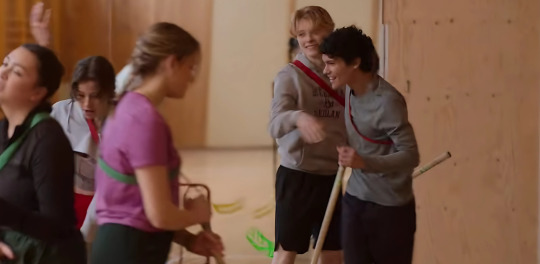
I want to preface this with a brief acknowledgment of Henry’s privilege and classism. It is not my intention to diminish them. I do, however, feel that it’s a bit apples-to-oranges to compare them to Simon’s views (citrus pun intended). 🍊 is politically active and has put in the effort to form his own beliefs, while 🍏 shows us time and again that he is ignorant of the world outside the elite bubble and not inclined towards deep reflection. He is largely a product of his upbringing and the (liberal conservative) values imparted by his parents.
While Henry doesn’t grow enough to change his core views and values in the canon timeline, he does change his views on Simon. This isn’t enough progress for them to become actual friends before we leave off (I doubt Simon could be friends with someone who only exempts him), but I would still argue that they end the show on amicable terms.
And yes, I mean that in a mutual sense, even if Simon doesn’t soften towards Henry quite as much as Henry softens towards him!
So, let’s dive in!
Dialogue taken from the English CC and [abbreviated or corrected].
1.01: the tax debate
Henry: “Take my dad’s estate, for example. They’re struggling to make ends meet because of the high taxes.” [Simon chuckles and explains his views] Simon: “Like your dad. [Do you know how much he gets in EU subsidies every year]”? Henry: “And what the fuck does your dad do?”
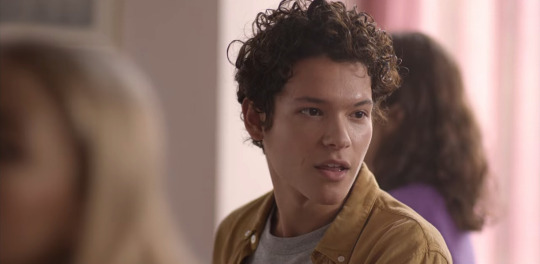
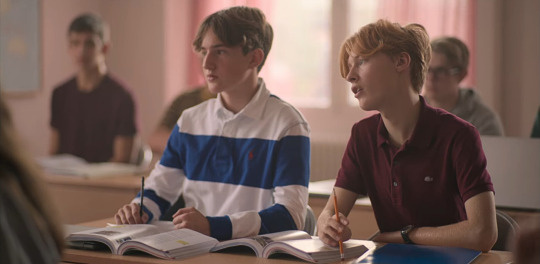
Like most viewers, I find it a lot easier to relate to Simon’s views than Henry’s here – but I do think Henry often gets judged quite harshly for insulting Simon at the end. His comment does not come out of nowhere (cf. Stella’s unprompted dirty look at Simon and Sara when she talks about welfare scamming).
Henry only knows that his father has said their estate is struggling, so of course he won’t take kindly to Simon suggesting that they are actually getting undeserved subsidies instead. It’s also important to note that this estate isn’t just any old farm. It was granted to one of his ancestors as a reward for their services to the Crown, which makes it a core part of his family history. As we learn in 1.04, Henry is a Society boy and very proud of his noble ancestry, and Simon’s comment likely feels like an insult to his entire family. So although his retort is unquestionably rude, it is understandable that he lashes out.
Also, Henry has no way of knowing that Micke is a deadbeat. He is just applying a common stereotype (and potentially making assumptions based on the views Simon just expressed on welfare).
1.02: parallel but separate experiences
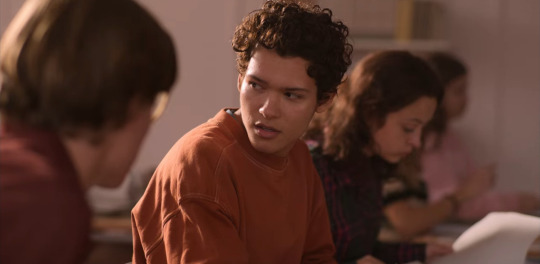
Early in this episode, we see Simon side-eye Henry and Walter for the paid tutoring. He decides to follow their example, but as we know he can’t actually afford it, we can already guess it won’t go as well for him as it did for them.
Next, we see Henry in the group as the rowing team ignores Simon at morning training. The camera also pans to him and Walter when August gives that bizarre speech about Simon’s class journey.
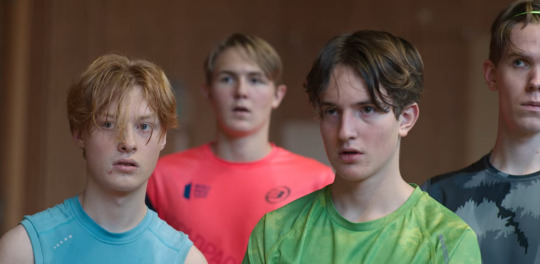
These moments highlight how different life at Hillerska (and beyond) looks for Henry and Simon. They are technically coexisting and even doing the same things, but their experiences are nothing alike.
However, there is also some potential for development here. August’s words about rowing bringing people together (and also about the class journey) should absolutely be taken with a heap of salt, but as we no longer see any open animosity between Henry and Simon, we can still wonder if rowing played a part.
Being on the same sports team is an entirely new frame of reference for these guys. They are no longer just the sosse and aristocrat who have been going to school together since pre-canon and clashing over their views; they are crewmates. They may be able to ignore each other for most of the time, but they may also have to do some team activities or even cooperate on occasion. At the very least, they will be around each other several extra times a week from late September/early October to Christmas break. This could definitely help to put them on more neutral ground.
1.05: Henry pays attention to Wilmon
In this episode, Henry learns more about Wilmon than the average Hillerska student knows. He is present when August tells the Society that Wille and Simon “hang out”, and also when Wille changes the plan from Simon to Alexander.
What’s more, he actually looks fairly thoughtful leaving that last meeting. We don’t know if it’s just shock over Wille’s ruthlessness, if he’s thinking about the plan to set up Alexander, or if there’s something else on his mind.
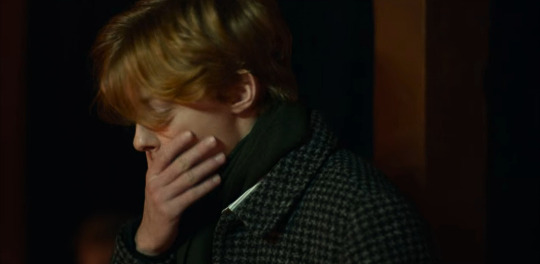
Now, this may veer into overinterpretation, but for the sake of thoroughness, let’s also include the blink and you’ll miss it moment before the Lucia procession where Henry notices Wilmon texting each other. In this cropped screenshot, you can see him looking at Simon, who has just put his phone down and is looking over at Wille.
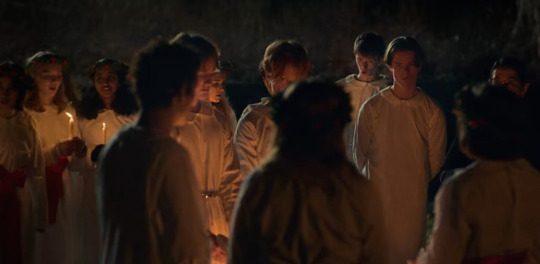
1.06: Henry shows restraint
As we know, Henry is the only classmate who tries to treat Wille normally after the video, asking if he “saw the match yesterday” (he absolutely knows Wille didn’t). What is perhaps less noticeable is that he also shows more restraint than most of his schoolmates when the rumour mill gets going.
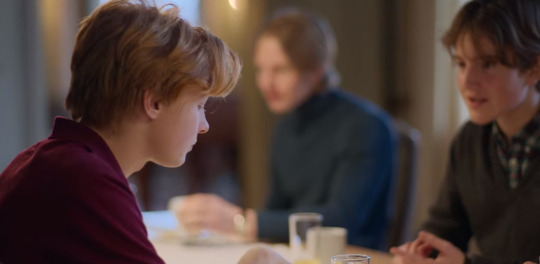
In this scene, Henry is pretty dispassionate reminding Walter that Wilmon sat next to each other at movie night and the two of them talked about it. There is a stark contrast to Walter, who absolutely pounces on that bit of gossip.
This one quick scene could just be a coincidence, but the same thing happens again when Wilmon return to school. Instead of engaging with the others who are all eagerly talking and whispering, Henry is already sitting at his desk minding his own business when Wille arrives. His only reaction to Simon showing up is this quick look, which is immediately followed by his show of kindness to Wille:
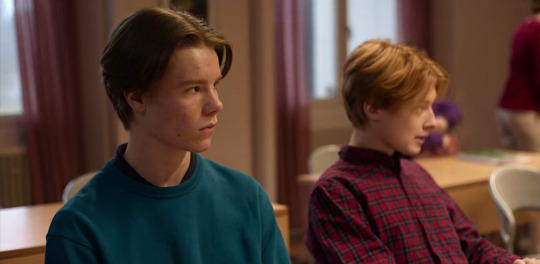
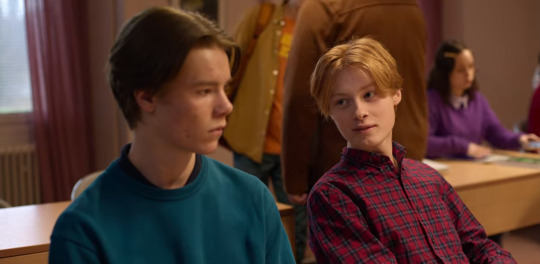
So the restraint does look very intentional.
As an aristocrat, monarchist and Society boy, Henry is loyal to Wille, who he now knows has been carrying on with Simon for a while already. He also knows how far Wille went to protect Simon, despite the fact that Simon had actually supplied the drugs, so he is going to side with Wille.
What’s more, Henry’s behaviour in these scenes also confirms that he isn’t hostile to Simon. We can surmise he probably doesn’t think Simon is the most appropriate choice of partner for the crown prince, but he is willing to take his cues from Wille. We never see him sneer, joke, or say anything nasty about Wilmon as a couple (cf. Stella and Fredrika joking about surrogacy).
We are also shown his reaction to Wille hugging Simon before we move on to season two.
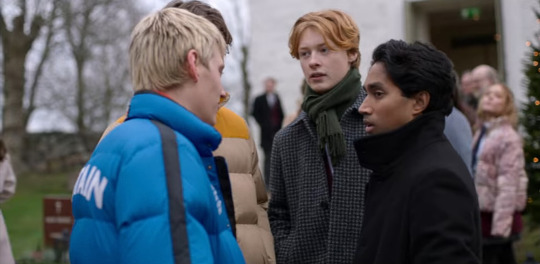
2.02: the floorball hug and walk-by
The first interaction between Henry and Simon in S2 is them celebrating a floorball goal with a spontaneous hug, as seen at the top of this post. What a difference a term makes!
Now, I don’t think this moment is meant to signify that they are friends all of a sudden, and I do feel it comes slightly out of the blue. I suspect it was included as a nod to those who already liked Henry after S1, but I for one would’ve preferred to actually see their reconciliation.
But then again, if their initial antagonism was always class conflict rather than personal beef, maybe there was no need for apologies…? Maybe each of them just accepted that the other was going to be around and decided to try and get along (potentially aided by their shared rowing team history)? Henry is following Wille’s lead as we already saw – and as for Simon, I doubt he would be hugging Henry even in the heat of a game if he held a grudge. Whether we saw it or not, they have moved on.
In the same episode, we also have the locker room scene.
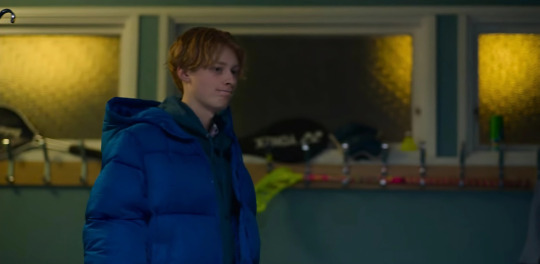
Contrary to popular opinion, I don’t believe Henry actually overhears the entire conversation, but he may have still heard something about them having to wait two years (as Simon did raise his voice for that). It’s also possible he comes out of this scene assuming that Wilmon still “hang out” in secret. In any case, he probably assumes that Wille wants to keep the whole thing quiet, as per the usual “policy” on queer relationships among the upper classes. In addition to his monarchist ways, he also seems to be casually friendly with Wille in S2 (keeps inviting him to do stuff, from coffee to pranking Sprucewood). So it makes a lot of sense for him to keep whatever he overhears or suspects to himself.
2.03, 2.05 and 2.06: book report scenes
While Henry must be a nightmare to have in the group, he and Simon are nice to each other in all the book report scenes. This is further proof that they are in a place where they can talk civilly and even work together.
They start the project before the rowing race and only present it the day before the gun range scene, which means they had these group sessions for at least a few weeks (the timeline is a bit wonky here).
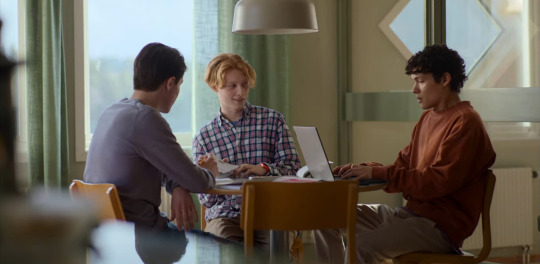
2.04: Henry snitches on Wille and Felice
The lunch scene at the start of the episode starts with this bit of vicarious interaction, as Henry and Simon (and Wille too) are amused by the nonsense Walter is spouting about girls:
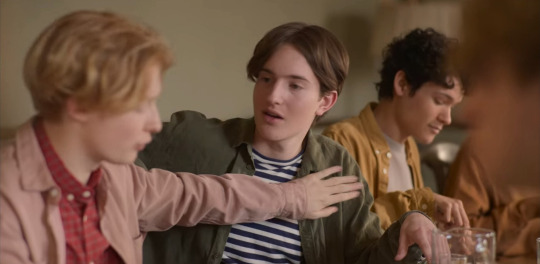
Also, Walter's monologue feels more comphet every time rewatch it, but I digress.
As this post is focused on Henry and Simon, I’m not going to dig too deep into Henry’s role in spreading the story about Wille and Felice. Suffice it to say that he did tell his canonically gossipy bestie Walter, and it was recently pointed out to me that he seems to have let something slip to someone else as well. In the common room, Walter goes “det var du som sa till…” [you were the one who said to…] just as the focus shifts to Wille and Nils, which suggests that Henry either purposely told someone or misspoke without realising it. The latter would explain why he seems genuinely appalled when Wille confronts him, but it’s not a hill I’d be willing to die on!
If Henry did spread the story on purpose, I assume it was because getting with Felice was considered a credit to Wille and also “fair game” to tell, unlike the relationship with Simon that Wille wanted to keep hidden.
Still, Henry and Simon are definitely on better terms in S2. Even though Henry inadvertently causes pain to Simon with his part in the Wille and Felice thing, they still keep working together on the book report without any animosity.
Insofar as Henry’s lacklustre effort can be called working. Simon is a bigger person than I am for not blowing up at him when he announces minutes before the presentation that he won’t be taking any questions.
3.01: background Henry
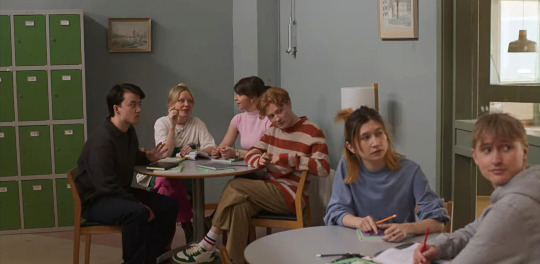
We start S3 off with this one-sided interaction where Henry reacts to Wilmon kissing with a mild smirk. No more waiting or secrets to keep.
3.02: double standards on the camping trip
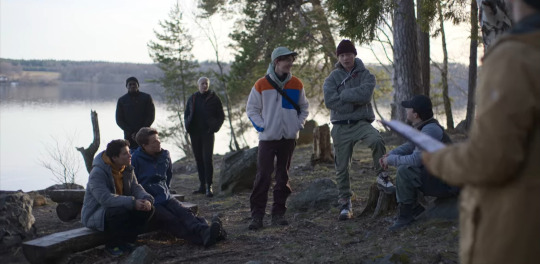
It’s not entirely clear what Henry is thinking when he says the infamous line about gay couples being allowed to share but not straight ones. I think some people read it as him deliberately putting Wilmon on the spot, but personally, I doubt he even realises it’s going to make them uncomfortable. He’s just noticing the double standard and pointing it out to mess with the teacher.
While Simon is very clearly not pleased with Henry for the comment (glares at him while saying to Wille that people are going to think they plan to have sex), he does not seem to hold that against him. Because what we do see them doing soon?
Sitting next to each other by the fire, even though Henry could’ve easily sat with Walter and Simon with Wille:
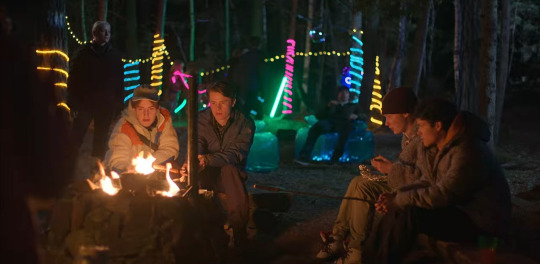
Also, it seems Henry isn't new to camping, as he tells Wille that part of the fire is too hot to grill a sausage in.
The part where things get interesting is when Henry acts classist towards the Marieberg students.
Henry seems to be down with meeting Rosh and Ayub, who are there as Wille and Simon’s friends. But after Fredrika brings up New York, he agrees that the situation turned “stiff as fuck.” That stiffness was entirely Fredrika’s fault (I think she is at least semi-consciously trying to mark herself as the most compatible partner for Stella there), but Henry seems to feel it was more about Rosh and Ayub not fitting in.
He also sneers and makes nasty comments when the other Marieberg students get into an altercation with Malin, which elicits a frown from Simon.
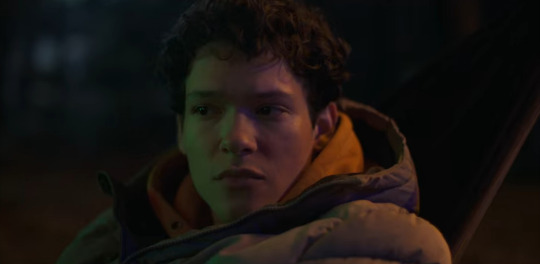
And yet, Simon does not condemn Henry as strongly as he might have done in the past.
Importantly, Simon tells Wille “it wasn’t the right time for everyone to meet.” This indicates that he could’ve imagined them all getting along at a better time, and it’s pretty clear that also includes Henry. Furthermore, “you [meaning Wille and the others] don’t realise how privileged you are sometimes” is actually a pretty neutral way of putting it. Simon would have been entirely justified if he had said the others were classist pricks, but he blames their privilege and lack of understanding instead of their character.
All of this forms a backdrop for my interpretation of the scenes in the next episodes.
3.03: First of May
Simon: “You do know that you’re not off so you can party the day before, right?” Henry: “Uhh…what?” Simon: “It’s the First of May.” […] “The day of the labour movement?” Henry: “Okay, so what’s their style? How do they celebrate?” Simon, scoffing: “You don’t celebrate. You demonstrate.” [Henry and Walter share a chuckle]
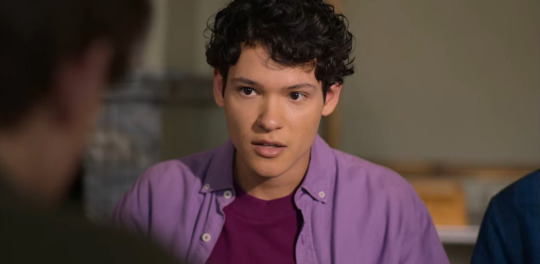
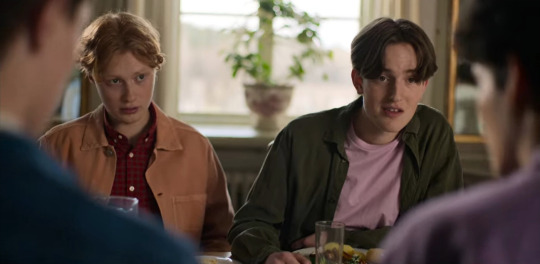
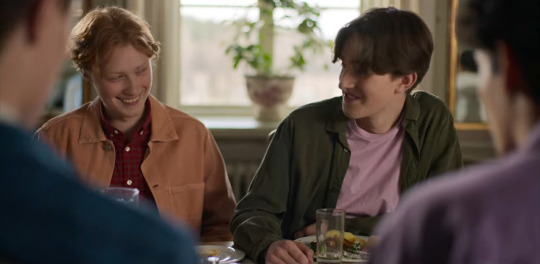
This may be a controversial take, but I don’t think Henry is being particularly nasty to Simon here.
He actually looks and sounds quite sincere asking how the labour movement celebrates. When he and Walter laugh, it reads more as “there he goes again, our very own sosse, saying wacky things!” than the kind of disdain he expressed towards the Marieberg students in the last episode.
Simon also doesn’t take the laughter as an insult; he’s just stupefied by their ignorance. Also, note that he already scoffed at Henry’s question, marking the question as silly.
This exchange is immediately followed by Vincent attacking Simon for his beliefs, which feels like an intentional trick to create contrast between his and Walty’s treatment of Simon.
3.04: the lollipop
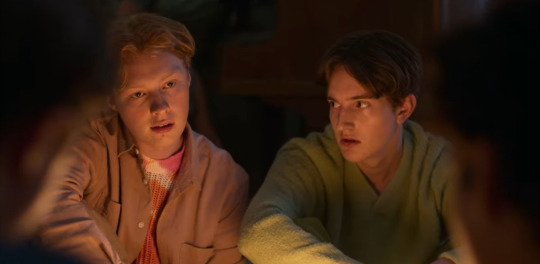
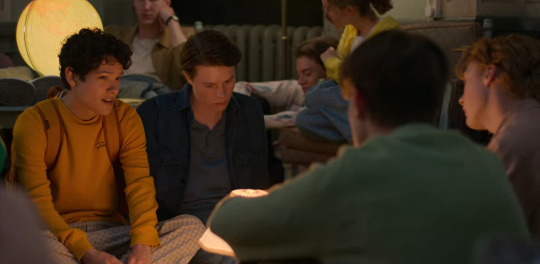
In this scene, Henry starts out asking quite nicely and seriously if Simon has another lollipop, as if they had that kind of rapport. Simon makes a face, but then he just shakes his head and nicely says no. It’s only then that Henry switches to offering money for the already half-eaten lollipop, to which Simon reacts with disbelief.
He does not, however, get snarky with Henry. He settles for exchanging a look with Wille as Walty go on to complain about the hunger strike. Only when Henry isn’t present anymore does he point out to Wille how ridiculous Henry was being.
In a sort of parallel to the lunch scene, Simon and Wille now share a chuckle at the wacky thing Henry said:
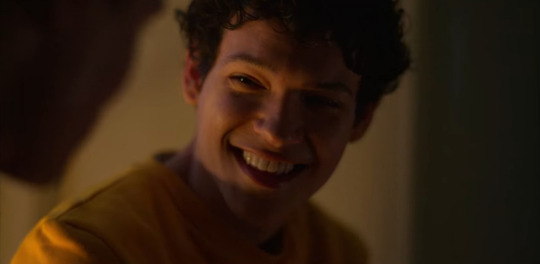
Feel free to disagree, but I actually wonder if this could be a common pattern between Simon and Henry. They have accepted that they aren’t going to see eye to eye on many things, but instead of getting into conflict, they just roll their eyes/laugh at how the other can seriously believe/say such things. Then they let the conversation move on to something else.
Which is a perfectly valid dynamic. They can acknowledge that their outlooks on life are wildly different without hating each other for it.
3:06: Henry includes Simon
Look, I dislike the library scene as much as the next person. The talk that Henry interrupts between Wilmon was so much more important than anything he could possibly say. It was just a moment of comic relief that didn’t add anything to the story.
Except… Now that we are tracing Henry and Simon’s “not-quite friendship” arc, this scene does give us a conclusion.
Henry: “Hi! Uh, what are you wearing tonight?” [He rambles on about clothes] Wille: “I don’t know if… If I’m coming.” Henry: “Okay…?” Simon: “I don’t know if I can come either.” Henry: “Oh come on, you two have to come!” [He rambles on about how much fun it will be] Simon: “Yeah, we’ll see. I have to go now.” Henry: “The point is that we have to be together! This is the only night we have together, maybe ever. [I mean, we are brothers!]”
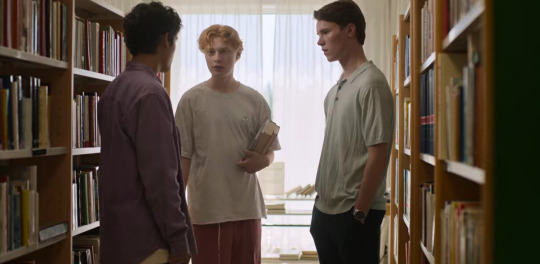
In Swedish, Henry goes “vi är ju bröder” just as the music starts. This has been translated to “we are like brothers” in the English CC, which is already quite something, but the little word ju makes the original even stronger. It means that something is true, so instead of just saying they are like brothers, Henry is saying that is what they are.
(In the dub, there is an audible pause after like, so Henry is actually using it as a filler word. They should have put a comma in the CC to denote that.)
Given that Henry prefaces this ramble with “you two have to come” and barely stops to acknowledge Simon’s exit, there’s every reason to assume he is still talking about all of them. He is saying he considers himself, Wille, and also Simon part of the brotherhood that will be disbanded indefinitely come morning and wants them all to have one last night of fun together.
Simon never hears the brothers part and is of course frustrated with Henry for interrupting, but he still takes his leave on a casually friendly note. He gets that Henry wants him to come and have fun (Henry is unaware that Simon doesn’t drink when he tries to persuade them both by talking about the alcohol). Thus, Simon politely says “we will see” even though he has zero intention of going.
We do not see them interact at the party when Simon goes after all, but we do hear Henry being ushered away when Simon comes to talk to Wille. We don’t see it’s Henry, but someone insists that he wants to stay just as we see Walter and Alexander leave, and all three of them were there moments before:
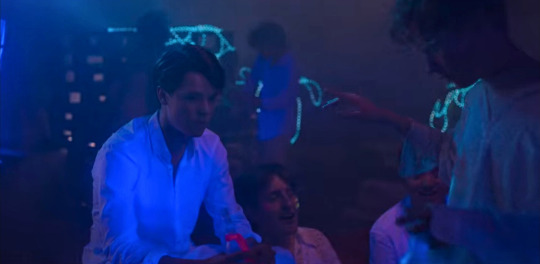
I’m tempted to end this with a parallel to Wille’s initiation party.
Way back in 1.01, Henry and Simon were explicitly shown discussing the first party with their friends. They never talked about it with each other or interacted there – Henry attended as part of the in-crowd, and Simon only got to go because he supplied the alcohol. But for this last party, Henry was the one to get the alcohol, and he specifically invites Simon to come. They still don’t hang out as they are both there with their respective friends, i.e. in their own bubbles, but those bubbles do bump into/brush past one another without clashing.
Kind of like Henry and Simon’s lives.
Thank you for reading this marathon post! I hope my take on these two brings something to your next rewatch, whether you agree with me or not!
#young royals#henry young royals#simon eriksson#young royals analysis#henry and simon#yr faves fest#yr events#YRFavesFest2024#long post#with pictures!#wish i had the energy to write something new about these two#scheduled post#young royals meta
106 notes
·
View notes
Text
Half-Foots and Ainu Culture in Dungeon Meshi
It sometimes feels like I might be grasping at straws with this, but I do feel like it's not completely unfounded. Please note, I am a white woman living in the USA, I am by no means an expert on Japanese culture in general, much less a marginalized subculture. I have simply made limited attempts to educate myself out of genuine interest born from exposure to media about Ainu characters and culture. I am always hoping to learn more.
I think it's fairly obvious that many parallels can be drawn between Ryoko Kui's Half-Foot race, and more than one ethnicity or subculture in real life. Romani, Irish, and Jewish stereotypes come to mind immediately.
But I think there's another one that may be explored less in the text, and much harder to catch by a western reader, but nonetheless could be intended by Kui, or perhaps was at one point. That of the Ainu people of Hokkaido, Japan.
There's not a lot of translated information about the Ainu online, so please bear with my limited knowledge. In short, the Ainu are the indigenous people of Northern Japan. For generations, their way of life has been taken from them and they were forced to assimilate to the wider Japanese culture. There are not many who still fully practice the cultural heritage in this day, but there are movements to bring the Ainu culture back.
In Delicious in Dungeon, there are two instances that reference the Ainu, both relating to Chilchuck. This could, of course, be a coincidence, especially if there are more references that I missed. It may be flimsy, but it still feels significant that this is the case, and that Half-Foots are or were meant to be an allusion to the Ainu.
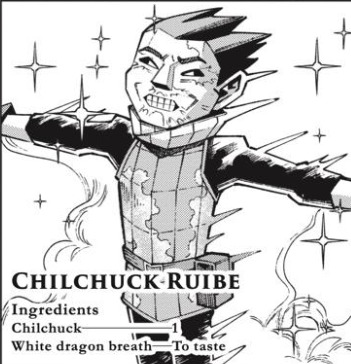

This is the first instance. A significant panel in the context of the story. To my knowledge, this is the only specifically Ainu dish that's referenced in the text. On it's own, its just an interesting factoid, and the same dark humor that's being used for all the other character deaths in this fight against Thistle.
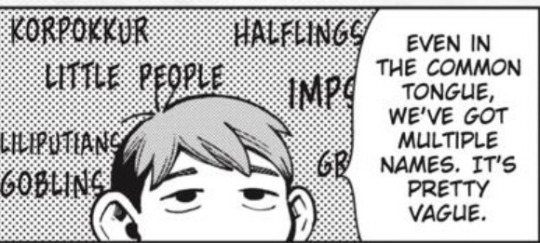
This is the second instance. From the supplemental material rather than the main story, Chilchuck is discussing what Half-Foots are called across the languages. The one that caught my eye here is the one in the top corner. Korpokkur.
The Korpokkur are a race of small people in Ainu folklore, their name meaning "those who live under the butterbur leaves".
Again, in a vacuum, this could just be a Japanese person using a Japanese word [Edit: Correction; An Ainu word] in her manga. But I think it's interesting that the two instances of Ainu culture being referenced have to do with Chilchuck and Half-Foots as a whole. It could warrant a deeper read-through looking for other references, perhaps by someone more educated than myself.
I think this could have some interesting implications in the wider worldbuilding. Perhaps the Half-Foots have faced similar cultural erasure and assimilation attempts, which is why a lot of their customs and clothing are just "Tallman but smaller", and why other races regularly mistake them for the children of tallmen, despite having pretty noticeable differences in how they look other than just their height(their disproportionately large ears, for example).
This idea might be a tad more indulgent, but I also like the idea that Half-Foot children don't receive a permanent name until they are toddlers. At one point, in Ainu culture(this may not be practiced today, I could not find information on that), the Ainu would give their children "vulgar" placeholder names until they started forming personalities, as a ward against evil spirits. Perhaps the same is done for Half-Foot children, and their two part names are selected when they are a little older.
Again, these are just the observations of an outsider looking in, please feel free to correct any mistakes I may have made! And if I'm completely off-base or have said something offensive, I apologize and will delete or amend the post as necessary.
#delicious in dungeon#dungeon meshi#chilchuck#chilchuck tims#half foots#dungeon meshi half foots#dungeon meshi spoilers#dunmeshi#ainu#ainu culture
194 notes
·
View notes
Note
I'm writing a story where a childhood friend comes back into the protagonist's life after a few years and there are some lingering romantic feelings between them, but the protagonist is in a relationship, although it's a casual relationship that he feels more seriously about than the other person involved. Both relationships are developing through the story, but I'm having trouble showing the contrasts between the two relationships. What are things I could add to show how differently they both know the protagonist?
Illustrating Differences Between Two Relationships
If you haven't already, go ahead and flesh out what both of these relationships were like. What were the strengths of each relationship? What were the weaknesses? What was the most romantic moment? What was the least romantic moment? What was the average date night like? What was the average "time spent together" session like? What three memories would the protagonist highlight as their favorites of the relationship? What three memories would they highlight as their least favorite?
Once you've fleshed out what the relationships were like, you can use the following methods to illustrate them for the reader. You can provide contrast by illustrating them in close proximity. For example, maybe the current love interest does something romantic, which makes the character think of the most romantic thing the previous love interest did.
Ways to illustrate the relationships for the reader:
-- have the protagonist recall past relationship memories either via the narrative or via dialogue; find a way to relate this recollection with something parallel in the current relationship
-- use a current relationship moment/situation to lead into a flashback where the protagonist relives a similar/better/worse moment in the past relationship
-- use internal monologue to have the protagonist mentally process differences in the relationship
-- use dialogue with another character to have the protagonist discuss differences in the relationships. You can also have the other character make observations about differences in the relationships.
-- have the protagonist notice differences triggered by things like photographs, old e-mails or letters, mementos or gifts, etc.
Some other things to keep in mind:
-- illustrate differences in how the love interests reacted to similar situations/moments/events
-- illustrate differences in protagonist's emotional state during similar interactions with each love interest
-- highlight commonalities and differences between the protagonist and the love interests
-- illustrate differences in emotional and physical chemistry
Hopefully this will get you on your way to illustrating and examining key differences between your protagonist and their current/previous love interests. Happy writing!
•••••••••••••••••••••••••••••••••
I’ve been writing seriously for over 30 years and love to share what I’ve learned. Have a writing question? My inbox is always open!
♦ Questions that violate my ask policies will be deleted! ♦ Please see my master list of top posts before asking ♦ Learn more about WQA here
104 notes
·
View notes
Text
What Sky’s Character Should Have Been
(And why her and Viktor needed to be canon.)
This is LONG, and just my opinion. Please be nice!
In storytelling, each character, each scene, and each literary device is crucial for the advancement of the plot. If any is over or under utilized, the story remains cluttered or incomplete. That being said, it truly is a tragedy how horribly the characters, especially the Zaunite characters, came to be treated in season two. The characters and arcs set up in season one are butchered, and Viktor’s story is particularly disappointingly miswritten by the authors and misrepresented by the fandom, and we see this in the narrative and to a certain extent even fan treatment of Sky.
Sky is a ghost. Her presence, while tangible in the story, is not fully realized to the audience. We do not get to know much of her besides her interest in Viktor and a small flashback indicating that they knew of each other in their youth. Thus her existence and her death are ultimately unsatisfying; we do not know enough about her to be able to connect with her, and so she is ultimately only perceived to be an object to propel Viktor’s descent, even though we do not know much of his feelings towards her either. This is an unfortunate misuse of her as a supporting character, especially when it has a good potential reason to exist other than to solely be Viktor’s love interest.
Before understanding what Sky can represent, let us first define her in the context of the setting, particularly in relation to the characters that she supports. I have touched upon this in more detail in my Viktor character analysis posted, but for the TLDR:
It is clear that Jayce and Viktor are foils to one another. The difference in their opinions on Hextech sets them up to be a parallel to an important aspect of the class struggle set up in season one: Even when the oppressed are “good enough” to compete with their privileged peers, the resultant treatment by the oppressor between both is starkly different. Where the privileged will be lauded and commemorated, the oppressed will only be served minimal acceptance and approval. Thus, their characters and how they interact with one another, as well as the characters of their immediate mutual contacts and their own corresponding interactions, should serve explore this struggle further, especially when it comes to Sky, Mel, and Heimerdinger.
So Sky, like Viktor, should show how Piltover can misuse Zaunites against their hometown. However, to keep her character separate from him, unlike Viktor, who loses himself getting out of this trap and back to Zaun, Sky must be lost to trap itself. She must show just how inhumanely far Piltover will go in exploiting Zaun to maintain its subjugation over the latter. Like we see with other innocent Zaunite background characters that are killed by Piltover on the battleground, Sky must represent those that are killed in softer, more covert methods: through the extraction of Zaun’s finest intellect and the resulting false diplomacy. We must eventually see how Piltover indirectly kills her for being Zaunite, even though we know she is killed by Viktor and the Hexcore.
Sky then needs to have a fleshed out background that indicates of her optimism, grit, and innocence. It does not have to be as in depth as that of the main characters, but the audience must be shown the following:
Her academic prowess that indicates how she can capture sponsors and spin her botany research to help Zaun into something that Piltover thinks it can also benefit from. From which councilors or patrons does she benefit? How and why?
Her motivations for Zaun. What does she view an ideal Zaun to be? What would its relationship with Piltover be? We know she wants to make it better by creating natural greenery, but why does she choose to do so in Piltover? What pushed her to apply to the academy?
Her relation to Viktor, the only other known Zaunite at the academy. Did they interact more than that one time in the river? Were they friends or mutuals? How did Viktor help her get a position as his assistant and why? We know she is fond of him, but what about the other way around? What are their experiences at the academy like? How do they interact with casual prejudice? Do they stick up for each other? Do they find support in each other?
We must see her struggles to successfully obtain funding and traction for her own research due to Piltovan pushback and prejudice. (In this case, she must be in the same research group as Jayce and Viktor, but no longer their assistant as a decade is far too long to remain as such. She will be tied to Jayce’s name but not under him or Viktor.) This needs to be shown to contrast Jayce’s ease in becoming a councilor and gaining enough authority to push out Heimerdinger to further his and Viktor’s research. We need to see her project take the back seat because it is not the project that Jayce is directly tied to. We must see her have to to be careful and planned in who she talks to, how, and what she is able to get from them. This would provide a perfect parallel to Mel and about how being outsiders provides challenges when it comes to change; one being born into power with an imperialist upbringing and getting past Piltovans gracefully to a councilor position to invite it, and the other having no power and so relying on the street smarts and a resource seeking mindset from a more impoverished background to scavenge for it… yet both using the same methods (smooth talking, strategic connections, etc.) to do so.
We need to also know her relationship with Zaun and her perception of Piltover. She must be shown to nurture her feelings about the unfair treatment of her home into a more determined and optimistic view of potential equality and diplomacy, and their growth over time with her and Viktor’s research and their duty to represent Zaun. We should see her friendship with Jayce. We should see her interact with Mel and Heimerdinger. This not only lets the audience sympathize with her by empathizing with the struggles she faces above and her defiance in face of them, but also contrasts Viktor’s internal anger about Zaun and Piltover that he lets fester with his growing ailments and erasure of academic and technical contributions. This contrast sets her up nicely to symbolize the “good that could have been” in the relationship between Zaun and Piltover, and thus by extension, between Viktor and Jayce - hence her initial role as their assistant, and something that is cast aside as each character grows more towards their goals rather than the partnership.
This also sets her up to personify Viktor’s humanity. We’ve seen them meet. Let us see them study together, build things together, perhaps even fend for essentials together. Let us see how and why Sky fell in love with the Viktor from her youth. Let us know of Viktor’s endearment of her as we see him choose her to be his assistant. Let us see how they interact after facing prejudice from Piltovans and band together. Let us see her meet him when he’s on the hospital bed. Let us see her and Viktor be protective of and vulnerable with each other as they face the enemy. Let us see them bond just like we have seen him do so with Jayce. With Sky, we can see Viktor’s insecurities and his empathy like no other character can; in her we can see what makes him human.
This is integral to Viktor’s character and his arc. Whereas Jayce can actively work towards a future for his life with Mel and his career outside of Hextech, Viktor does not have the same luxury due to his illness. He cannot pursue anything but Hextech because his life and the lives of his people are on the line due to Piltover’s control. And that is precisely why when Sky loses her life due to the technology, it isn’t just Viktor that kills her. It’s Piltover’s waste, Piltover’s luxuries, Piltover’s unfulfilled promises that do. And Viktor realizes that after. Sky, in all her optimism, is fundamentally what Viktor could have strived for had he not let his anger and urgency spiral. As a mirror to Mel and Jayce, Sky is not just Viktor’s past but also his hopes for the future. And he realizes that he and Zaun has lost what could have been.
By giving Sky agency, we see just how much she could have done for the plot. But seeing how much the story fumbled Viktor, it’s not surprising to see her get “fridged” twice. I hope I did her justice!
If you’ve read this all, you deserve all the desserts. Thanks for reading!
69 notes
·
View notes
Text
EDIT: THIS POST IS INACCURATE !!!
I made the assumption Olive was editing the wiki articles, and while that's a very logical conclusion to reach, it was actually someone who shares the same viewpoints as them!!! Anything including the wiki articles and Olive's involvement is wrong and that's my bad!!!
Alright fellas, I guess we did it. We have reached the tipping point. I'm going to dedicate this post to calling out one specific person, @olivescales3, and their very toxic behavior. This post will be a bit messy, and I do apologize in advance, I'm writing this from the perspective of a Ninjago fan who also thinks beyond just the petty fandom stuff, what they're doing is just not cool.
I will clarify, I do not make this post for petty fandom drama, I make this to better spread awareness on some of the bullshit they're doing, so you can look out for and understand that they're bullshitting. Without further ado, I think we should just get into it.
So, what have they done?
Now, I should say while there is no 100000% concrete link between hyenabro and olivescales, I think based on their talking points (as well and the information I've recieved from friends in the Chima fandom, who have a bunch of prior experience with them,) it's safe to make this assumption!
So, what has olivescales DONE in this case? Simple, they've vandalized the Chima wiki on NUMEROUS occasions, even after several different people have revised their revisions, so as to discredit any conenctions between Dragons Rising and Chima.

(Green is their edits, red is the ones prior to theirs, I found this while going through their contributions section on their Fandom account, HyenaBro119)




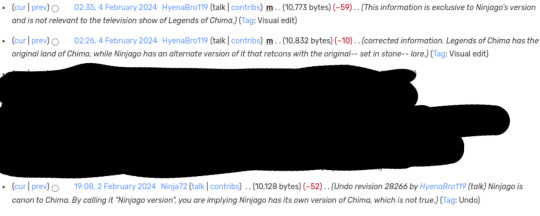


As seen here, they have (under the username HyenaBro119) edited the pages for Chima AND the Forever Rock (I have two similar screenshots of essentially the same thing, one was from the Forever Rock article, the other was from Chima) and claimed Ninjago's lore to be some alternate universe. To further validate it, they write "Ras' visit to," but Ras NEVER claimed to have VISITED these locations, just that he knows them. They also claim the Forever Rock was destroyed, a blatant lie. Only a small section of rock on the Forever Rock was actually destroyed, not the whole thing.
Now, you're gonna ask "but Raine, how can you 100000% say it's them?" and I will cite common sense. While I cannot directly tie Olive to hyena, I CAN say their wording is SO very similar.
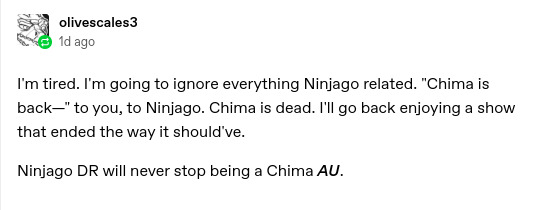

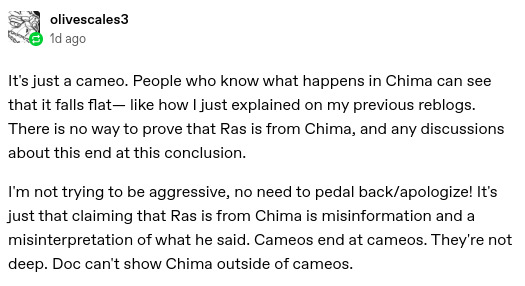

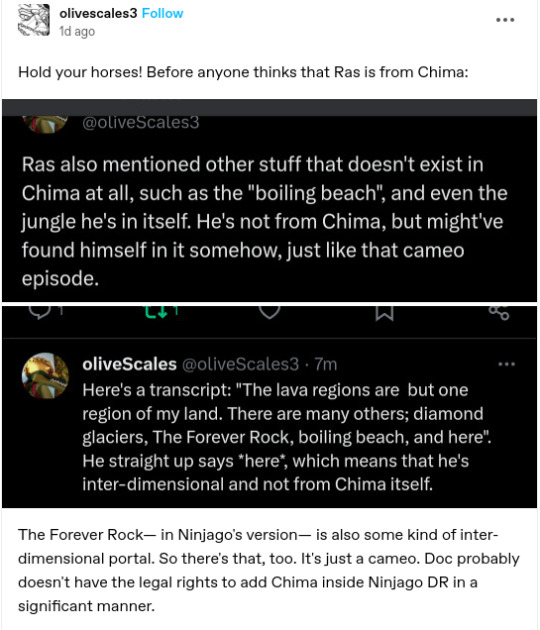
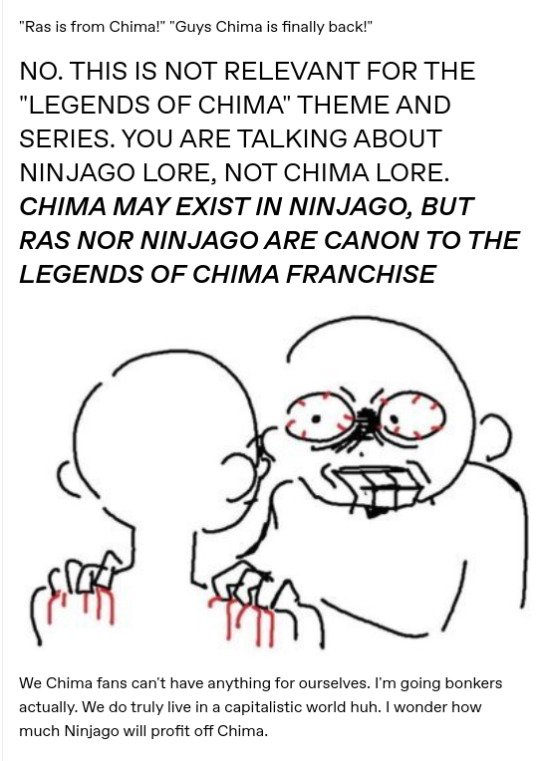
Both Hyena and Olive call DR "a parallel/alternate universe," and again, claim Forever Rock was destroyed, WHICH IS A FULL ON LIE. They're so adamant to protect "the sanctity of Chima's pre-established, set-in-stone lore" that they can't stop to think maybe, JUST MAYBE, sometimes a story can get new lore which can ALSO be canon!
I'd also love to share this HILARIOUS screenshot of one of their many posts, which not only backs up what I'm saying, but it's like damn they really set themself up huh!
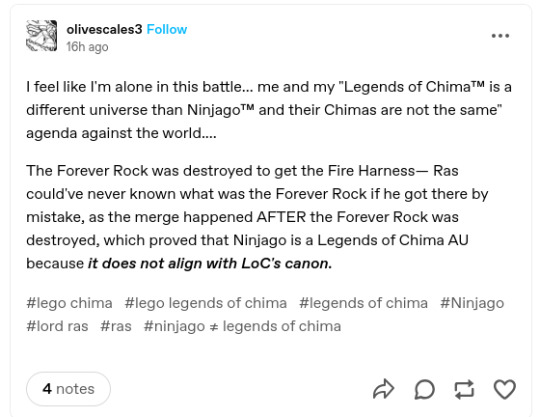
Gee I wonder why you feel alone! Maybe it's because you are! Maybe it's because you're lying and making shit up to prove yourself right! No one is as big of a hater as you!
The also LOVE saying Ninjago cannot do anything with Chima unless they get express permission from the creator of Chima, some guy named John Derevlany, but oh man what's this I see before me?

CO-CREATOR? Oh but Olive, I thought he was the CREATOR of Chima, not CO-creator... ALSO Lego owns the rights to Chima, and Ninjago, and every other theme, as said by Doc himself! If anything he wasn't really dodging the question, just giving a vague answer, because he doesn't know much about the old contracts!
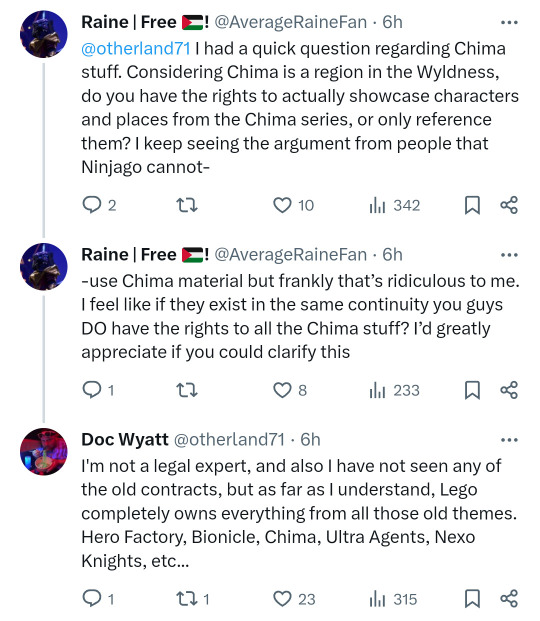
From what he said, it's clear that if they wanted to use anything from the other themes, they'd have to consult folks over at LEGO, not John Derevlany or Tommy A.!
Now here's the THING, I GET where they're coming from, it CAN be annoying to have people only care about a thing you like in relation to something else, but when you're going out of your way to argue that none of it can be canon and it's all an alternate universe it's like... god it's so sad and pathetic really.
Their lies and BS don't even end there with the wiki shit, because I have THIS glorious gem.
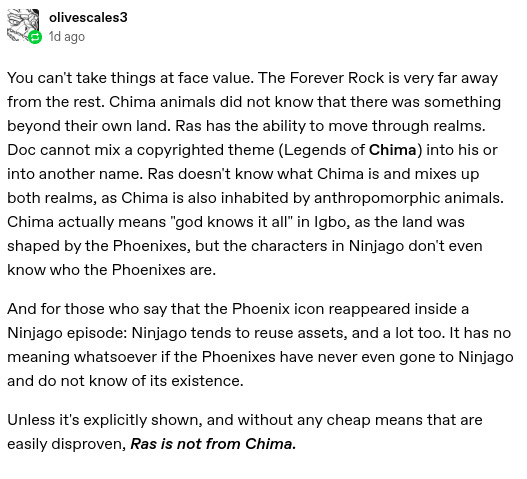
A) They bring up that the Ninjago folk do not know who the Phoenixes are which is like, okay??? Why the fuck are they gonna know about how another universe was created??? That's like if someone told me I don't exist in the same universe as my glasses because I have no clue who made them, that is to say, that's stupid as FUCK to say!
B) OH they say something REAAALLL funny ohohohho I am actually dying. Olive says the Phoenix icon "appeared in a Ninjago episode" and "Ninjago tends to reuse assets." Yep, NINJAGO is the one who reused the phoenix symbol, mhm. The symbol that was made in 2011 for NINJAGO, which cameoed in CHIMA in 2014, was actually just an asset reuse by Ninjago. I feel like this actually goes to show how desparate they are to feel right and validated, because this? This a lie! Ninjago made the symbol, and because Tommy A. is co-creator to both, he wanted to slip in a neat Ninjago reference, so he slipped in the Phoenix symbol Nya uses for the Phoenix tribe, not the other way around!


Another REALLY funny thing they did, aside from the wiki and Phoenix symbol shit, was this hilarious attempt at being right!

Yes, the compared the WOLF Masks to BATman's cowl, and did a horribly rough comparison illustration that very much does not make sense. If you actually compared them side by side, the only similarities would be they're both angry animal themed mask with pointy ears, which does NOT go very far in the long run. The foreheads they drew aren't even the same fucking shape lol.
OH ANS WE CANNOT FORGET THIS ONE! Their using a post about the Palestinian genocide and boycotting Lego in order to complain about Ninjago.
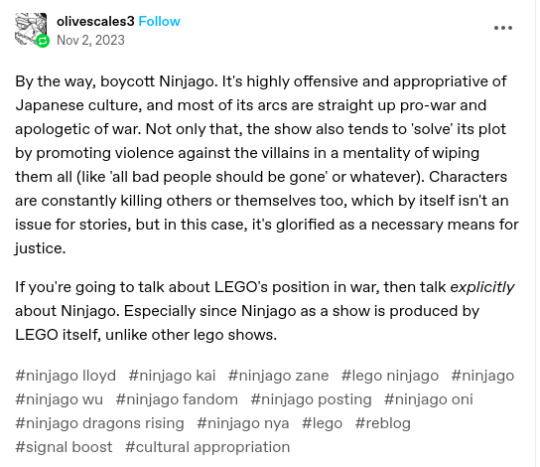
They claim Ninjago is produced by Lego, unlike other Lego shows, which is an EXTREMELY bullshit fucking claim. Just like Chima and Nexo Knights, Ninjago is produced by Lego, it's not JUST Ninjago produced by Lego, they are all Canadian-Danish CGI action shows, and they're all known to have Tommy Andreasen involved in the creation of them.
They're using a post about boycotting for the sake of innocent people DYING to complain about a lego ninja show for... killing evil people? It doesn't glorify war, the worst it does in regards to war is like not address how fucked up it can be in regards to the Serpentine War, but that's like it. I think it's so funny they want to single out Ninjago as if it's the only TV series where villains die for trying to conquer/destroy the world.
So, what do I want the takeaway from this post to be? What do I want you to get from it? I don't really know anymore, I just don't want Olive's horrendously toxic behaviors, and straight up lies to stop. If anything I think it's beautiful that Ninjago is making others interested in revisiting Chima again, stop being such a fucking hater dude. They act like Chima is some holy grail of Lego, the greatest thing since bread, but it, just like Ninjago, Dreamzzz, Hidden Side, and Nexo Knights, have Tommy in creative roles.
To act like Chima is somehow greater than is to place it on an unrealistic pedestal as if it's a godsend, when in reality it was co-created by Tommy Fucking Andreasen.
If you read through all of this, I do THOROUGHLY appreciate it, I didn't mean for this post to descend into an angry ramble but ehhh yk how it is. And Olive, if you see this, please, just stop with the bullshit.
#ninjago#lego ninjago#ninjago dragons rising#lego ninjago dragons rising#lego chima#lego legends of chima#chima#legends of chima#callout post#long post#edited all 'she' for 'they' here !!
293 notes
·
View notes
Text
holly wheeler - who/what are you? an informal post about all of the holly oddities I've discovered so far.
where do I even begin with this one? I'm just going to jump into it and show you all the weird connections I've found that mostly relate to holly-el/jane, holly-alice and holly-sarah. I have no real conclusions so far so I invite everyone to take a look and share their thoughts.
oddity one: the hair
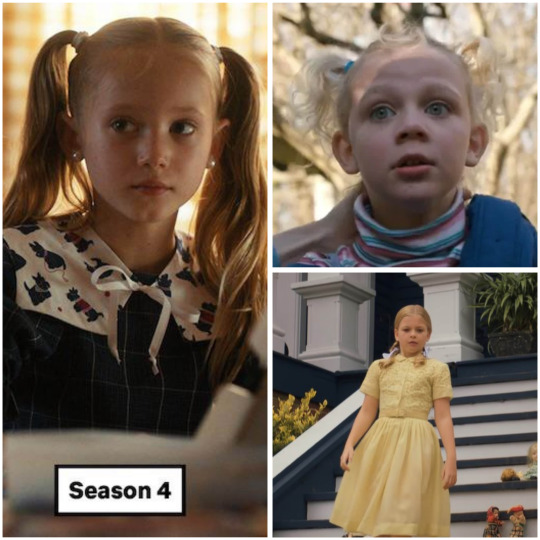
All four are blonde girls, and three have pigtails or twin braids, reminiscent of rabbit ears.
oddity two: the rabbits
terry ives' home, inside what should have been jane ives' room:

holly wheeler and her rabbit lite-brite:

alice creel and the dead rabbit:

And why the rabbits? Well, they're all a reference to Alice in Wonderland. The first rabbit in the painting in Jane's room is just literally the rabbit from AIW, fitted with a pocketwatch.
Alice in Wonderland:

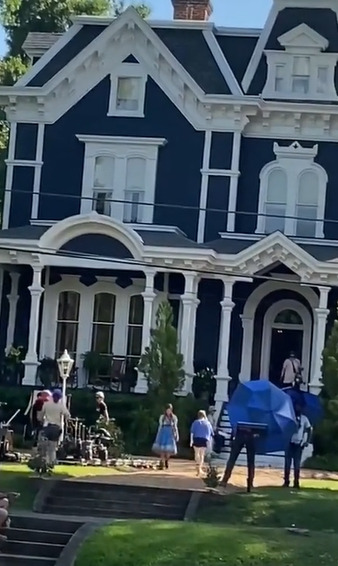

Just check out #whiterabbitgate for more on the two above, the song 'White Rabbit' is also connected to El and just general HNL activities.
The Rainbows:

(above is the Terry Ives flashback from season two)


Holly's outfit in Season 5 is incredibly colourful and there are at least 3 different rainbow items inside her room.
The Flowers:




^ Holly even has yellow red and blue flowers on her bicycle basket.
My questions have already been: why is Vecna/Henry seemingly interested in her enough to not only lure her but continue 'playing' with her for multiple scenes? Why is Holly suddenly relevant?
I'm also a BTVS fan, and the idea of a younger sister suddenly introduced had me thinking of Dawn. Dawn was Buffy's younger sister introduced suddenly in Season 5 (literally out of nowhere) - until it turned out that she wasn't a fully real person, but a powerful energy turned into a human that was sent to the Summers' house where they would protect her. She never existed until she was fourteen, but they all believed she had with false memories. Furthermore, she becomes the target of that season's villain which Buffy has to protect.
So then we get to Holly's room:

Most notably for this post are ALF and the 'A Royal Pain' book. Let me just show you the plot summaries for both, starting with ALF:
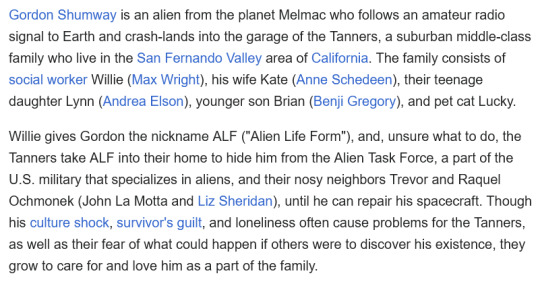
I initially thought the ALF reference was just a reference to El (and it very much could be a dual thing). But considering the strangeness.... and the parallels that are coming to light between them.
A Royal Pain:
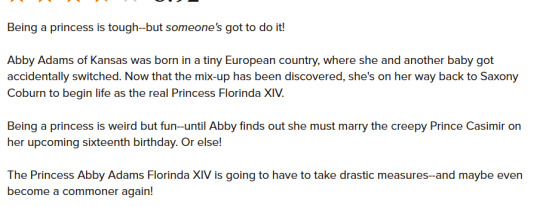
There has already been baby-switch precedent in the show. In fact it's a major theory about Jane Ives and El - that they aren't the same child. But when it's been specifically brought up, it's been in relation to the Wheelers. Karen, was your other daughter swapped in the hospital? Or something even crazier?

I'll get to more when my ideas are less of a mess. But there's also something interesting @bylerposting has brought up - the way that Mike has this whole interesting out of place dialogue with El.
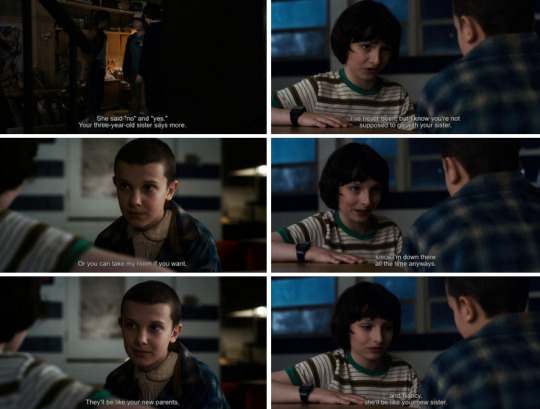
But what if it wasn't about El - what if it was also subtext for Holly? She came into the family even though she wasn't a biological daughter. The Wheelers were like her new parents, and Nancy was like her new sister.
And there's so much more I'm thinking of but can't get to right now, like Holly with the lights and her perception of the supernatural before others sense it. I just want to get this ball rolling for real.
#this post is a MESS im so sorry#holly wheeler#el hopper#jane ives#alice creel#sarah hopper#(maybe less so)#whiterabbitgate#the wheelers#stranger things#something is WEIRD with the young girls in this show#but yeah uh. what if holly isnt a wheeler#biologically#st5 theory#st5 speculation
146 notes
·
View notes
Text
Unknown (2024) visual analysis (ep. 1-8): How to film heartache

This show.
The writing and acting continue to be fantastic, but I feel like I haven't seen enough appreciation for Unknown's cinematography, which captures the heartache of Qian and Yuan's changing relationship so beautifully.
Here are some of my favorite moments of visual storytelling so far...
Framing & Composition
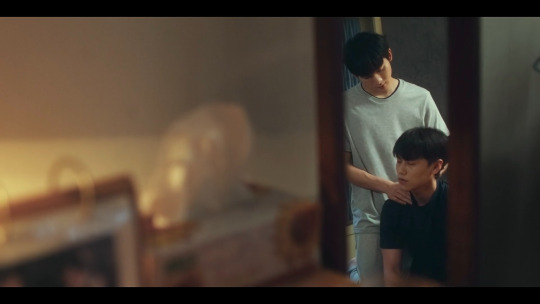
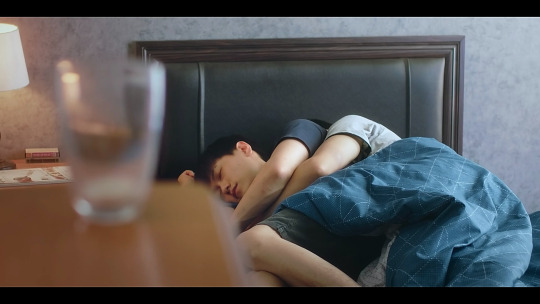
Something that I immediately noticed about Unknown is how much dirty framing it uses. "Dirtying the frame" is when a cinematographer uses architecture, nature, objects, or even people in the foreground to add depth to a shot. In earlier episodes, we often see Qian and Yuan framed together by everyday household objects.
These shots emphasize the uniqueness of their relationship: they are brothers because of the domesticity surrounding them and yet at the same time the framing almost tucks them away into a private space of their own. Their relationship is born from yet separate from the familial space they share with Lilli.

So when Yuan drunkenly confesses his feelings and shatters any lies Qian might have been telling himself about their complex relationship, the camera language loses its earlier intimacy.
We suddenly see more medium and long (versus close-up) clean shots where the characters are surrounded by tons of negative space, isolated from each other.
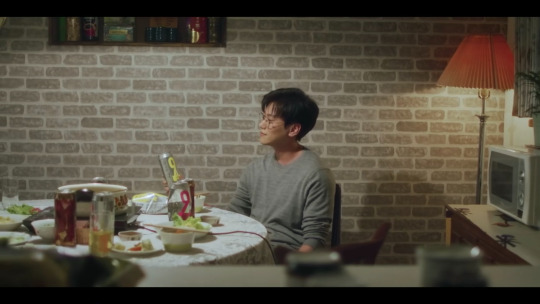
I also don't think it's an accident that we start seeing more dirty frames again once Yuan leaves for America and Qian realizes how much he misses him.
The New Years scene is a perfect example of this. As Qian miserably cheers an absent Yuan, we see the camera subtly pans to the side of the table where he'd usually sit. No one has been able to occupy that private space at home or in Qian's heart.
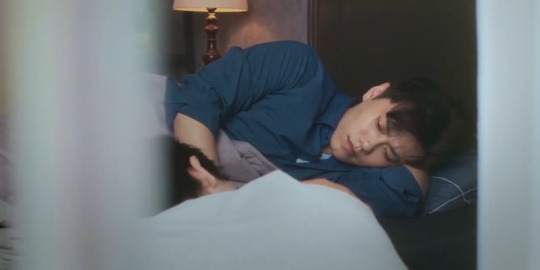
Visual Parallelism
In a previous post, I've talked about how visual parallelism (when we link characters, events, storylines, etc. through a shared image) can signal major changes in the relationship between two characters, and the show uses this technique in multiple ways. (Yuan’s cheeky and completely satisfying “is there something you want me to do?” in Episode 8’s seatbelt scene, for one.)
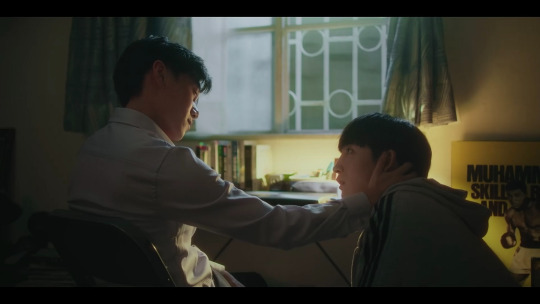
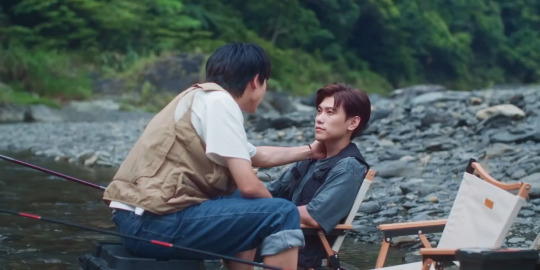
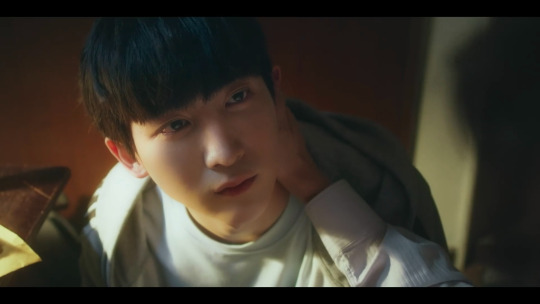

But I think the most striking moment is when Yuan asks Qian to confront his own feelings at the end of Episode 8.
When we look at the composition, camera angles, and actor blocking (how the actors are positioned in relation to one another) we can see that the scene directly mirrors the moment that Yuan gifts Qian with cufflinks in Episode 6. In that episode, Yuan is shot from a high angle, making him look even younger and more vulnerable, while Qian cups his face from above, anchoring him as he tries to give misguided advice:
Qian: I actually feel sorry for you. Isn't it tiring to love him? Yuan: It is. It's so tiring to like someone you shouldn't like. Qian: Then what are you doing? Why are you limiting yourself?
It's notable then that during the last scene of Episode 8, the roles are reversed and the blocking and camera language changes accordingly. Throughout Episodes 7-8, we can see the ways Yuan adopts a more mature approach to his interactions with Qian. He has made it clear that he still cares about him but he will only make another move if Qian clearly expresses his desires. Now it's Qian who is the most unsure and vulnerable, with Yuan anchoring him:
Yuan: Wei Qian, don't you like Wei Zhiyuan? If you do, is it only because we're brothers? This thing about us, is it that you don't want it or that you don't dare?
Like Qian had advised him years ago, Yuan now asks why Qian insists on limiting himself by denying what he wants.
Bonus Parallelism:
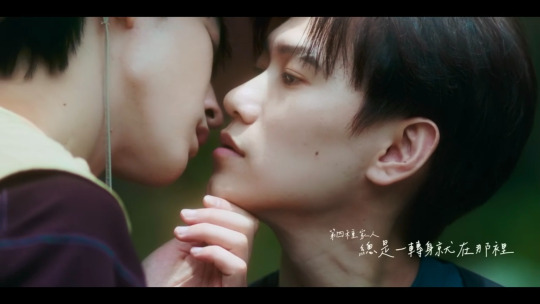

Both Yuan and Qian's kiss fantasies mirror each other as well.
352 notes
·
View notes
Text
Episodes 3 and 4 of Love in the Big City left me feeling wrung out and hung to dry. Like episodes 1&2, there are a lot of strong parallels between the two major relationships in this part (like I wrote about in my post on Part 1, Mi Ae and Nam Gyu both represented heteronormative conformity). In this part, both Yeong's mother and Yeong Su fail Yeong in critical ways related to their self-image and their (internalized and externalized) homophobia. Both of their rejections of his fully actualized self (primarily his sexuality) are a betrayal, and both lead to serious trauma (in his mother's case, institutionalization, in Yeong Su's case, a suicide attempt and hospitalization). Yeong's face as those orderlies try to force him into the van will haunt me, as will the gut punch of reading the title of that article written by Yeong Su about the evils of homosexuality, written while Yeong was in his bed. And the irony of both of these people knowing and liking this song about someone who desperately misses and reaches out to someone who rejected them is also not lost on me.
The other part of this section that I can't stop thinking about (and the part that made me cry) was the T-aras banging on Yeong's hospital glass. Even in the midst of Yeong's loneliness through this section, he had friends who were willing to be there for him. They checked in on him to make sure he was setting his expectations appropriately (he wasn't), drank tequila shots so he would not be drinking alone, and after his suicide attempt, made sure he knew he was not alone and he was loved. Having been on both sides of that glass, I know both how important that is and how it can feel like not enough.

#love in the big city#no book spoilers in this post#typed so that i can stop thinking it#sending finger hearts to everyone who needs them
87 notes
·
View notes
Text
The City and the Self: Or, the Uses of Lesbianism
someone in my server recently asked why Ikuhara seems so hung up on lesbians. I gave a short answer which in hindsight doesn't satisfy me. even this post won't touch on everything, there's plenty more that could be said, but here's a stab at a more complete answer, drawing from RGU specifically, though I think these points generalize to YKA as well.
a long time ago--around 2017, I believe--I posted in the RGU tag, asking about differences between how the western and Japanese fanbases see the show. the answer I got surprised me: I was told a popular fan theory held that Utena and Anthy were the same person. this is confirmed in the interview Ikuhara did with Mari Kotani:
Kotani: How did you think about relationships between two women, like the relationships between Utena and Anthy, Juri Arisugawa and Shiori Takatsuki, and so on? Sometimes it is thought of as one girl and her alter ego. Ikuhara: Yes, that's true of course.
at the time, this didn't make sense to me. now, though I don't take the "alter ego" concept literally, I certainly see where these theorists were coming from.


the very first impression the audience gets of the show, the opening seconds of the theme song, depict Utena and Anthy as mirror images of one another. I can't find the post now, but I once saw someone do a face swap of Utena and Anthy... and there was almost no difference in the final result aside from their eye color. yes, the show has somewhat same-y character designs (pointy chins, noses, etc.), and yes, Utena and Anthy are differentiated by coloring and height. however, there are differences in the facial features of the other characters, including other female characters like Juri and Nanami, meaning that you wouldn't get the same result from face swapping them that you do from face swapping Utena and Anthy.
visually, the show is trying to tell you something: Utena and Anthy are counterparts; not "the same person," in that there are clear contrasts between them, but perhaps different aspects of a single self. to put it another way, they cannot be separated from one another; what happens to one of them will affect the other, and how they relate to each other tells you a lot about how they relate to themselves.
RGU is not the first story to have this premise. I just watched Ingmar Bergman's Persona, which uses two women to tell the story of one woman, and that came out all the way back in 1966. I think that it's possible to do this kind of story with characters of different genders--however, it's most often done with homosexual/homosocial pairings because two people of the same gender are seen as better mirrors to one another.
when I initially gave my response as to why Ikuhara writes a lot of lesbians, I cited the influence of shoujo manga. however, I didn't detail how homosexuality was featured in those manga.
Ikuhara once said that the core theme of shoujo is "self-revelation." he wanted to capture that in RGU, and it seems to have come across. consider Takemiya Keiko's reading of RGU as "A story about independence, about finding oneself. It feels like a story about a girl defining 'what is myself?'"
this journey of self-discovery must involve encounter with the other. part of romance is other-longing, the desire to meet the unknown; love requires a separate entity which is not merely an extension of the self (this is why I don't believe that Utena and Anthy actually are "the same person"). through encountering the other, one can find one's own self, and further, through this encounter, the selves which meet can be transformed.
while plenty of 20th century shoujo did center heterosexual couples, I believe that homosexual and homosocial relations were so prevalent because they facilitated this romance more effectively. on a visual level, a homosexual pairing can create a clearer parallel, as discussed above. for a more thematic angle, RGU's lead writer Enokido has mused that homosexuality removes the issue of "genetic advantage" from the equation; since there is not a clear "survival and reproduction" benefit to homosexuality, it is easier to see it as "pure love." along the same lines, Ikuhara has said that "as soon as you see the destination point of producing children, sex becomes a social system." that's not to say that homosexual couples exist independently from social systems. the point is that writers who wish to pursue the idea of "self-discovery through the other" may wish to do so in the context where the norms of heterosexuality are not an issue, as they could muddy the water.
as an example, take Kaze to Ki no Uta, an influence on RGU. Gilbert and Serge, the lead couple, are very different people. often in conflict, their love ends tragically. that is precisely the power of the story: Serge, who is left alone after Gilbert's death, will live the rest of his life feeling incomplete, unwhole, because he has lost the "other self" by which he came to be defined. in Ikuhara's words, "It’s a story about that which forms the core of an artist - a starvation that can never be satiated."
when done properly, this kind of romance can be very moving, because it is not only a "love story" but also a story about the self and its relationship to the other. and even more potent are stories which are both about "finding one's other self" and about "the city":
Ikuhara: Out of your works, I particularly like the stories about cities... Stories of cities and “one’s other self” are enchanting aren’t they. There are a lot of shoujo mangaka who write about one’s other self, but there aren’t really any who write about cities. I think a story is weak if it only talks about relatives and neighbours and never about cities. In contrast, I think your stories which are simultaneously about cities really bring out their era. I think that allows you to mark out a line for the story of the other self. Takemiya: Personally, I feel at a basic level that stories without a sense of daily life aren’t very interesting. If one thinks of each person as a single cell, then the city becomes the “body”, and one cannot create a world without both. Based on where they live, some people become more modern or more provincial - the environment really plays a role. For me, it is a necessary component.
I agree with this exchange: the best stories about "one's other self" aren't solely about love between two people, but instead love between two people placed in a particular social context. it is that social context which gives the relationship flavor.
this brings us to the other reason that lesbianism (and homosexuality more broadly) is used in Ikuhara's works. not only does it allow him to tell stories about "one's other self," but also to tell stories about social systems. homosexuality is "deviant" within the social system that is set up to produce children in the nuclear family; thus, homosexual couples will face resistence and prejudice. as Ikuhara discussed in this interview, he is not necessarily trying to capture "the lesbian experience" in his works, but rather using lesbianism as an allegory for the sense of being a minority; a person outcast for standing out from the crowd. homosexuality thus allows for a marriage between the themes of "the self" and "the city" which are central to the telling of a great romance.
bringing it full circle, let's take a look at how this plays out in Utena and Anthy's dynamic, specifically the climax of the first arc. in the build up to it, Utena has been insisting that Anthy behave like a "normal girl," and believes she's succeeding in this venture. however, her illusions are crushed when Touga defeats her in the duel called Conviction. Anthy, now his bride, tells Utena that she likes being the Rose Bride and doesn't mind being alone.
Utena's reaction to this is interesting. suddenly, she is obsessed with being a "normal girl" herself, deftly signaling that all along, she was projecting her own conceptions onto Anthy. though she comes to realize this, Utena ultimately decides to duel again; in the episode 11 preview, she says, "Himemiya, wait! I have to try to get the real you and the real me back!" their selves are linked, tied; Utena cannot be herself without Anthy. what's more, the "false self" that Utena presents is linked to Anthy's "false self"--for, despite her words, it is quite difficult to believe that she "enjoys" being the Rose Bride, any more than Utena "enjoys" wearing girl's clothes. after Utena wins the duel called Self, she and Anthy meet again, paralleling the end of the first episode, but when Anthy tries to impart the rules of the rose crest, Utena tells her, "never mind all that, let's just go home." the two share a moment of authenticity, their "false selves" blown away like petals in the wind. they've drawn closer to each other and to who they truly are, while simultaneously gaining a level of independence from the system which seeks to define them by their gender. the rest of the show will play out in the same manner.
----
side note: I don't think that Ikuhara is more fixated on lesbianism than he is on male homosexuality; however, I'm not sure if he's focused on "mirroring" between homosexual males the same way he has between females, despite the fact that his cited inspiration for the way he wrote relationships between girls in RGU is yaoi.
82 notes
·
View notes